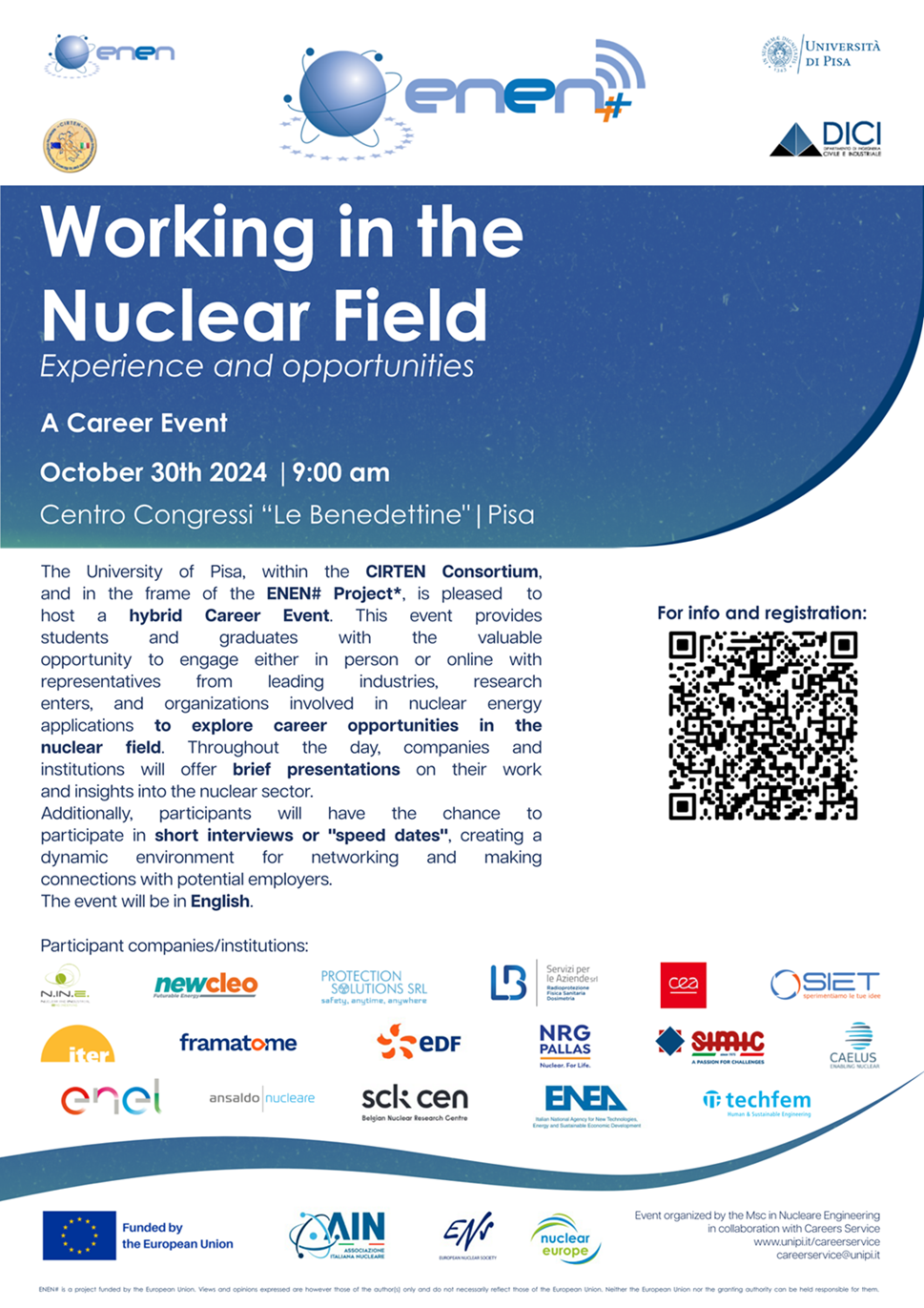Static
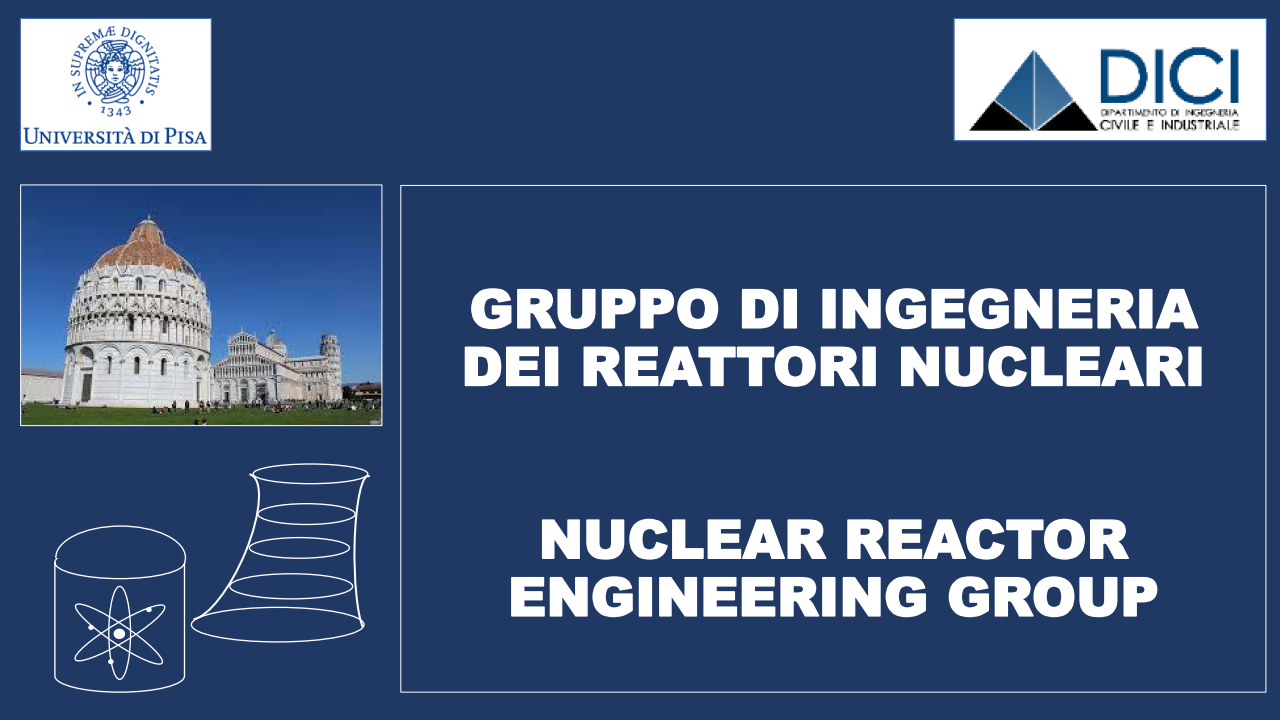
Expertise and Composition of the Group
The Nuclear Reactor Engineering Group of has specific teaching and research expertise in the following areas:
- Decommissioning and Waste Management,
- Reactor Physics,
- Existing and Innovative Nuclear Fission Plants (Gen II, Gen III and III+, Gen IV, SMR)
- Severe Accidents
- Nuclear Fusion Engineering
- Nuclear Materials
- Nuclear Measurements and Instrumentation
- Structural Mechanics and Nuclear Construction
- Radiation Protection
- Nuclear Safety
- Nuclear Thermohydraulics.
Currently, the Group is strong of:
- 4 full professors
- 3 associate professors
- 1 fixed-term researcher - type B
- 3 fixed term researchers - type A.
Main experience in the nuclear sector
The national and international projects in which the Group has been involved in recent decades have concerned various aspects related to the nuclear energy sector.
- Decommissioning and Waste Management:
- decommissioning strategies and management and characterization of waste and nuclear materials;
- design and qualification of containers for the transport and temporary and permanent storage of radioactive waste;
- participation in the UNI technical bodies and in the Scientific Council of SOGIN;
- anti-terrorism detection and "nuclear security" systems.
- Reactor Physics:
- development of deterministic numerical and deterministic-stochastic hybrid models for neutron transport;
- design of advanced reactor cores and reactor configurations for Boron Neutron Capture Therapy (BNCT);
- support for particle physics experiments;
- use of the most common Monte Carlo codes for radiation transport (MCNP, OpenMC, Serpent);
- use of the deterministic PartiSN code.
- Severe accidents in nuclear installations:
- modelling analysis of severe accidents and prediction of relevant transients in installations (MELCOR, ASTEC and ECART codes);
- modelling activities on the behaviour of dusts in fusion reactors, in collaboration with ENEA Frascati and RSE – Milan.
- Structural Mechanics and Nuclear Constructions:
- mechanical design and design and safety analysis in relation to internal and external events at reactors with ANSYS, MARC, PATRAN, COMSOL, DYTRAN codes;
- analysis of the problems of degradation and aging of nuclear components (in support of the extension of operation, LTO);
- development of innovative HPC and AI methodologies for monitoring and predictive maintenance of nuclear fission and fusion plants.
- Networking for higher education:
- Fusion Reactors:
- Nuclear instrumentation and measurements and radiation protection:
- radiation protection management activities at the level of Radiation Protection Expert;
- measurements of environmental radioactivity;
- shielding design;
- experimental testing of radioactive gas filter systems (for EdF);
- design of dosimetry and sensor equipment.
- Nuclear thermohydraulics:
- aspects of thermohydraulics of advanced reactors (AP600, SBWR, AP1000, EPR, VVER, LFR, SCWR, VVER);
- use of calculation codes for the thermohydraulics of light water nuclear reactor systems and innovative (RELAP5, CATHARE) and CFD codes (FLUENT, CFX, STAR-CCM+);
- experimental activities on passive systems (heat and mass transfer, natural and gas-injection assisted circulation (with own experimental equipment and in collaboration with SIET and the ENEA Brasimone center);
- interaction of liquid metal with water in refrigeration systems (SIMMER code); thermo-hydraulic and safety study of small modular reactors (SMR).
Activities and projects in progress or under development
- IAEA activities:
- Participation in IAEA CRP on supercritical water reactors and liquid metal cooled fast reactors;
- Participation in IAEA technical bodies.
- European Platforms and more:
- Participation in the European platforms SNETP, NUGENIA (various technical areas), ESNII, IGD-TP, EURAD 2.
- Agreement between the University of Pisa and the Joint Research Centre (JRC).
- Participation in GIF, EUROFUSION, Nuclear Energy division of ASME
- Participation in national/international consortia and projects:
- Participation in the CIRTEN Consortium.
- Association with the National Institute of Nuclear Physics (INFN).
- Participation in numerous PRINs and projects funded under the Programme Agreements (AdP).
- Support for the decommissioning of CISAM's RTS-1 reactor;
- IRMA project (POR CreO FESR Regione Toscana) on systems for the detection of gamma and neutron sources in containers;
- PRIMIS project (POR CreO FESR Tuscany Region) on the development of radiation detectors in hostile environments.
- Memberships of AIN, ANS, ENS, UIT.
- U.S. NRC Cooperative Severe Accident Research Program (CSARP)
- U.S. NRC Code Application and Maintenance Program (CAMP)
- Main European and international projects:
- European projects on passive safe reactors (DABASCO, SCACEX, INCON, THINS).
- European OperaHPC project for the development of Accident Tolerant Fuels.
- European project EVIDOS for dosimetry in mixed gamma and neutron fields.
- Networks of excellence and European projects on severe accidents (SARNET, SARNET2, EU PHARE, NUGENIA TA2, MUSA, SEAKNOT, INNOMUSA proposal).
- ASCOM in-kind project under NUGENIA TA2 related to the validation of the ASTEC code.
- European projects related to supercritical pressure light water reactors (THINS, ECC-SMART, current E-START proposal).
- European projects related to Education and Training in the nuclear sector (NEPTUNO, ENEN II, ENEN III, ENEN RU II, PETRUS, GENTLE, ANNETTE, ENEN+, ENEN++).
- Experiments on particle physics Mu2e and DUNE under construction at Fermilab.
- Fusion research activities funded by EUROFUSION and Fusion4Energy.
- Contracts with ITER for experimental activities.
- European projects on liquid metal cooled reactors (THINS, LEADER, SEARCH, SESAME, MYRTE, PATRICIA, ANSELMUS).
- European projects related to reactors with Russian technology (CAMIVVER, CAMI-NEXT proposal).
- European projects on the preparation of radioactive waste (PETRUS, PREDIS).
- European projects on the safety of existing reactors (NARSIS, TACIS Project U3.01/05 - UK TS 36) and on strategies for fourth generation reactors (ESNII Plus).
- European projects related to light water SMR reactors (ELSMOR, TANDEM. EASI-SMR proposal).

Expertise and Composition of the Group
The Nuclear Reactor Engineering Group of has specific teaching and research expertise in the following areas:
- Decommissioning and Waste Management,
- Reactor Physics,
- Existing and Innovative Nuclear Fission Plants (Gen II, Gen III and III+, Gen IV, SMR)
- Severe Accidents
- Nuclear Fusion Engineering
- Nuclear Materials
- Nuclear Measurements and Instrumentation
- Structural Mechanics and Nuclear Construction
- Radiation Protection
- Nuclear Safety
- Nuclear Thermohydraulics.
Currently, the Group is strong of:
- 4 full professors
- 3 associate professors
- 1 fixed-term researcher - type B
- 3 fixed term researchers - type A.
Main experience in the nuclear sector
The national and international projects in which the Group has been involved in recent decades have concerned various aspects related to the nuclear energy sector.
- Decommissioning and Waste Management:
- decommissioning strategies and management and characterization of waste and nuclear materials;
- design and qualification of containers for the transport and temporary and permanent storage of radioactive waste;
- participation in the UNI technical bodies and in the Scientific Council of SOGIN;
- anti-terrorism detection and "nuclear security" systems.
- Reactor Physics:
- development of deterministic numerical and deterministic-stochastic hybrid models for neutron transport;
- design of advanced reactor cores and reactor configurations for Boron Neutron Capture Therapy (BNCT);
- support for particle physics experiments;
- use of the most common Monte Carlo codes for radiation transport (MCNP, OpenMC, Serpent);
- use of the deterministic PartiSN code.
- Severe accidents in nuclear installations:
- modelling analysis of severe accidents and prediction of relevant transients in installations (MELCOR, ASTEC and ECART codes);
- modelling activities on the behaviour of dust in fusion reactors, in collaboration with ENEA Frascati and RSE – Milan.
- Structural Mechanics and Nuclear Constructions:
- mechanical design and design and safety analysis in relation to internal and external events at reactors with ANSYS, MARC, PATRAN, COMSOL, DYTRAN codes;
- analysis of the problems of degradation and aging of nuclear components (in support of the extension of operation, LTO);
- development of innovative HPC and AI methodologies for monitoring and predictive maintenance of nuclear fission and fusion plants.
- Networking for higher education:
- Fusion Reactors:
- thermo-hydraulic and safety studies of blanket refrigeration systems (WCLL) for ITER and DEMO (with codes RELAP5, SIMMER, MELCOR, ECART);
- analytical and experimental studies of the behaviour of fusion reactors in the event of an accident (small and large scale equipment).
- Nuclear instrumentation and measurements and radiation protection:
- radiation protection management activities at the level of Radiation Protection Expert;
- measurements of environmental radioactivity;
- shielding design;
- experimental testing of radioactive gas filter systems (for EdF);
- design of dosimetry and sensor equipment.
- Nuclear thermohydraulics:
- aspects of thermohydraulics of advanced reactors (AP600, SBWR, AP1000, EPR, VVER, LFR, SCWR, VVER);
- use of calculation codes for the thermohydraulics of light water nuclear reactor systems and innovative (RELAP5, CATHARE) and CFD codes (FLUENT, CFX, STAR-CCM+);
- experimental activities on passive systems (heat and mass transfer, natural and gas-injection assisted circulation (with own experimental equipment and in collaboration with the ENEA Brasimone center);
- interaction of liquid metal with water in refrigeration systems (SIMMER code); thermo-hydraulic and safety study of small modular reactors (SMR).
Activities and projects in progress or under development
- IAEA activities:
- Participation in IAEA CRP on supercritical water reactors and liquid metal cooled fast reactors;
- Participation in IAEA technical bodies.
- European Platforms and more:
- Participation in the European platforms SNETP, NUGENIA (various technical areas), ESNII, IGD-TP, EURAD 2.
- Agreement between the University of Pisa and the Joint Research Centre (JRC).
- Participation in GIF, EUROFUSION, Nuclear Enerngy division of ASME
- Participation in national consortia and projects:
- Participation in the CIRTEN Consortium.
- Association with the National Institute of Nuclear Physics (INFN).
- Participation in numerous PRINs and projects funded under the Programme Agreements (AdP).
- Support for the decommissioning of CISAM's RTS-1 reactor;
- IRMA project (POR CreO FESR Regione Toscana) on systems for the detection of gamma and neutron sources in containers;
- PRIMIS project (POR CreO FESR Tuscany Region) on the development of radiation detectors in hostile environments.
- Memberships of AIN, ENS, ANS, UIT.
- Main European and international projects:
- European projects on passive safe reactors (DABASCO, SCACEX, INCON, THINS).
- European OPERA project for the development of Accident Tolerant Fuels.
- European project EVIDOS for dosimetry in mixed gamma and neutron fields.
- Networks of excellence and European projects on severe accidents (SARNET, SARNET2, EU PHARE, MUSA, SEAKNOT, INNOMUSA proposal).
- ASCOM European project related to the validation of the ASTEC code.
- European projects related to supercritical pressure light water reactors (THINS, ECC-SMART, current E-START proposal).
- European projects related to Education and Training in the nuclear sector (NEPTUNO, ENEN II, ENEN III, ENEN RU II, PETRUS, GENTLE, ANNETTE, ENEN+, ENEN++).
- Experiments on particle physics Mu2e and DUNE under construction at Fermilab.
- Fusion research activities funded by EUROFUSION and Fusion4Energy.
- Contracts with ITER for experimental activities.
- European projects on liquid metal cooled reactors (THINS, LEADER, SEARCH, SESAME, MYRTE, PATRICIA, ANSELMUS).
- European projects related to reactors with Russian technology (CAMIVVER, CAMI-NEXT proposal).
- European projects on the preparation of radioactive waste (PETRUS, PREDIS).
- European projects on the safety of existing reactors (NARSIS, TACIS Project U3.01/05 - UK TS 36) and on strategies for fourth generation reactors (ESNII Plus).
- European projects related to light water SMR reactors (ELSMOR, TANDEM. EASI-SMR proposal).
ans 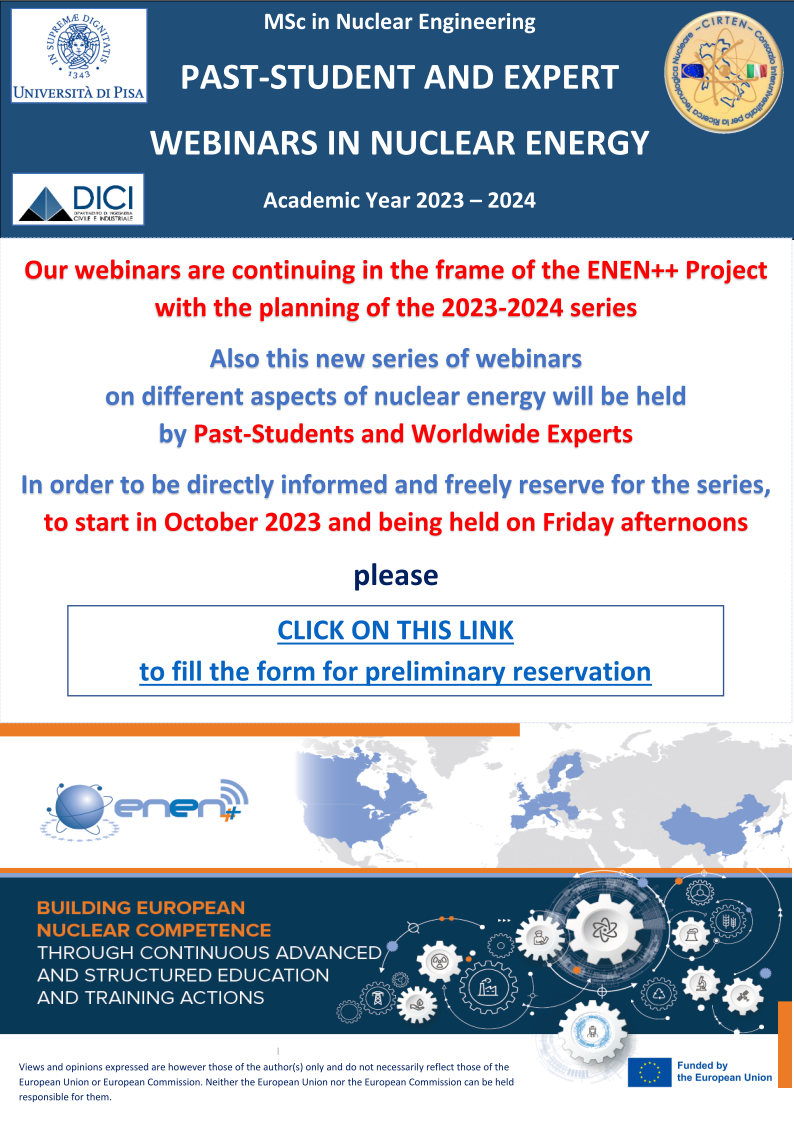
LIST OF WEBINARS FOR THIS YEAR
------------------------------------
06 October 2023 at 15:00 (CET)
Christophe Demazière and J.J. Gòmez Rodriguez, Chalmers University of Technology, Sweden,
Experience from the GRE@T-PIONEeR project
> Announcement and the CV of the lecturer
------------------------------------
13 October 2023 at 15:00 (CET)
Luca Oriani and Julie Gorgemans, Westinghouse, USA,
AP1000 Implementation, Operational Experience and Lessons learned
> Announcement and the CV of the lecturer
------------------------------------
20 October 2023 at 15:00 (CET)
Claudia Gasparrini, Imperial College London & Chair INYG, UK & Italy,
Fusion and fission synergies: materials and circulating fluids
> Announcement and the CV of the lecturer
------------------------------------
27 October 2023 at 15:00 (CET)
Mihaela Bacalum, IFIN-HH, Romania,
Biological effects of ionising radiation - New insights in radiosensitivity of cellular mechanism
> Announcement and the CV of the lecturer
------------------------------------
03 November 2023 at 15:00 (CET)
Risk and Mitigation assessments of H2 explosions: towards a safer H2 society
> Announcement and the CV of the lecturer
------------------------------------
10 November 2023 at 15:00 (CET)
Luca Ferrante, Bylor JV HPC, UK,
> Announcement and the CV of the lecturer
------------------------------------
17 November 2023 at 15:00 (CET)
Gianfranco Caruso, Sapienza Università di Roma, Nuclear Desalination
Webinar delivered in cooperation with the EU TANDEM Project
> Announcement and the CV of the lecturer
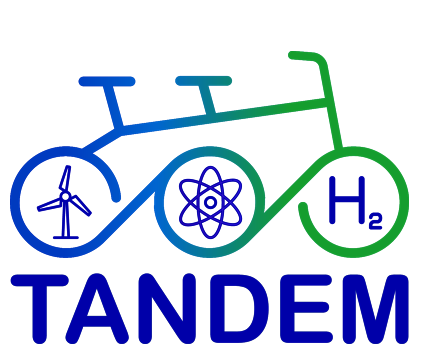
------------------------------------
24 November 2023 at 15:00 (CET),
> Announcement and the CV of the lecturer
------------------------------------
01 December 2023 at 15:00 (CET),
Virtual Reactors: Essential Tools for Developing and Operating Advanced Reactors
> Announcement and the CV of the lecturer
------------------------------------
08 December 2023, NATIONAL HOLYDAY IN ITALY
------------------------------------
15 December 2023 at 15:00 (CET)
Nuclear Batteries, a New Way in Energy
> Announcement and the CV of the lecturer
Webinar delivered in cooperation with the EU TANDEM Project

------------------------------------
22 December 2023 at 15:00 (CET)
Associazione Italiana Nucleare & ENEA, Italy,
Developing basic infrastructures for a new nuclear program
> Announcement and the CV of the lecturer
------------------------------------
MERRY CHRISTMAS AND HAPPY NEW YEAR

------------------------------------
12 January 2024 at 15:00 (CET)
Yves Desbazeille, nucleareurope,
A view from Europe on last policy / political developments
> Announcement and the CV of the lecturer
------------------------------------
19 January 2024 at 15:00 (CET)
Jeff Lane and Tommy Moore, Numerical Advisory Solutions,
High Temperature Gas Reactor Modeling using GOTHIC
> Announcement and the CV of the lecturer
------------------------------------
26 January 2024 at 15:00 (CET),
Gonzalo JIMÉNEZ, Universidad Politécnica de Madrid, Spain,
> Announcement and the CV of the lecturer
------------------------------------
02 February 2024 at 15:00 (CET)
Murthy Kolluri, NRG, The netherlands,
Investigation of RPV embrittlement at high fluence conditions: STRUMAT-LTO research
> Announcement and the CV of the lecturer
------------------------------------
09 February 2024 at 15:00 (CET)
Lucia Sargentini, CEA, Saclay for SPIN,
SPIN: the Society of Italian Nuclear Professionals in France
> Announcement and the CV of the lecturer
------------------------------------
16 February 2024 at 15:00 (CET)
Filippo Gagliardi, Nucleco spa - Sapienza Università di Roma,
State-of-the-art non-destructive techniques for radiological characterization
> Announcement and the CV of the lecturer
------------------------------------
23 February 2024 at 15:00 (CET)
Michele Frignani, Ansaldo Nucleare, Italy,
Ansaldo Group innovation towards sustainability goals
> Announcement and the CV of the lecturer
------------------------------------
Georges Van Goethem, Euratom former Manager of RTD Programs,
From fire to atom : energy at the heart of human history
> Announcement and the CV of the lecturer
------------------------------------
Marco Pellegrini, The University of Tokyo,
Recent Updates of Fukushima Daiichi Inspections and Prefecture Revitalization
> Announcement and the CV of the lecturer
------------------------------------
Ramona Bouwman, NRG, the Netherlands,
Modelling the up-take and biodistribution of radionuclides in the human body
> Announcement and the CV of the lecturer
------------------------------------
Luka Snoj, Josef Stefan Institute, Slovenia,
The role of research reactors in development of nuclear energy
> Announcement and the CV of the lecturer
------------------------------------
HAPPY EASTER VACATIONS

------------------------------------
Yannick Le Tonqueze, ITER Organization, France,
ITER radiation safety challenges - an integrated approach following ALARA principles
> Announcement and the CV of the lecturer
------------------------------------
12 April 2024 at 15:00 (CET)
Christian Schönfelder, Schoenfelder.Training, Germany,
NUCLEATION - the community of practice on vocational training
> Announcement and the CV of the lecturer
------------------------------------
Dominique Bestion, CEA, France,
What must be known when using system codes for reactor design and safety analysis
> Announcement and the CV of the lecturer
Webinar delivered in cooperation with the EU TANDEM Project

------------------------------------
Economy of Scale vs. Multiples: Bottom-up Cost Estimation of Nuclear Reactors
> Announcement and the CV of the lecturer
Webinar delivered in cooperation with the EU TANDEM Project

------------------------------------
Giorgio Simonini, EdF Lab Chatou, France,
Performance monitoring for PWR
> Announcement and the CV of the lecturer
------------------------------------
10 May 2024, (TBD)
------------------------------------
Bogdan Buhai, Framatome GmbH, Germany
Full scope replica training simulators for new builds validation and operator training
> Announcement and the CV of the lecturer
------------------------------------
Lorenzo Stefanini, NRG, The Netherlands
Long Term Operations of Nuclear Installations
> Announcement and the CV of the lecturer
------------------------------------
Andrea Alfonsi, NuCube Energy, Inc., USA
Microreactors for remote applications
> Announcement and the CV of the lecturer
------------------------------------
Carl W. Myers, Retired (Los Alamos National Laboratory), USA
Underground Nuclear Parks: Concepts, Benefits, and Issues
> Announcement and the CV of the lecturer
------------------------------------
14 June 2024, (TBD)
------------------------------------
> Announcement and the CV of the lecturer
Webinar delivered in cooperation with the EU TANDEM Project

------------------------------------
Non-electric applications of nuclear energy
Webinar delivered in cooperation with the EU TANDEM Project

------------------------------------
ANNOUNCEMENTS. CVs and LINKS to MS TEAMS for attending
Webinar by Christophe Demazière and Juan José Gòmez Rodriguez
on Friday October 6, 2023 at 15:00
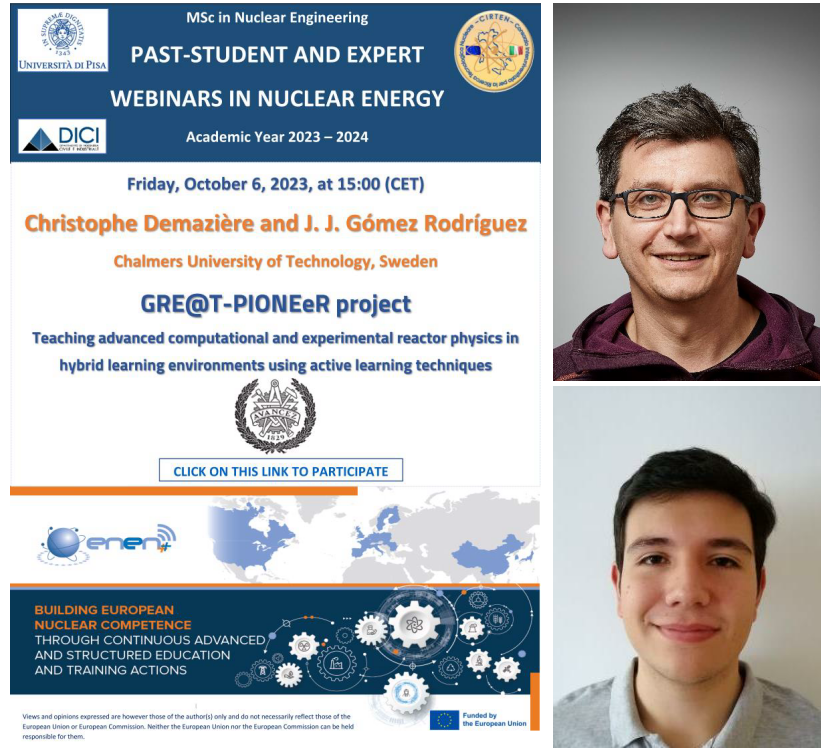
Christophe Demazière earned his PhD in reactor physics in 2002 and is now full professor at Chalmers University of Technology, Gothenburg, Sweden. He is responsible for the research and teaching activities in computational nuclear reactor physics at Chalmers. The research group gathers a cross-disciplinary expertise in neutron transport, fluid dynamics, heat transfer, and numerical methods. The aim of the group is to develop beyond state-of-the-art techniques for modelling nuclear reactors, thus contributing to improved simulations tools and enhanced safety.
Prof. Demazière is lecturing in courses on the physics and modelling of nuclear reactors. He has authored a book on the “Modelling of Nuclear Reactor Multi-physics - From Local Balance Equations to Macroscopic Models in Neutronics and Thermal-Hydraulics”. For the past ten years, he has been developing and implementing innovative pedagogical methods (flipped classroom, active learning, hybrid teaching and online teaching) in all his teaching activities, with the purpose of improving student learning and the learning experience. For that purpose, the effects of the teaching reforms are systematically analyzed and evaluated. Since 2020, he is the acting coordinator of the Horizon 2020 GRE@T-PIONEeR project.
He is a member of the American Nuclear Society.
Juan José Gómez Rodríguez is currently completing his master's degree in nuclear engineering at the University of Pisa, Italy. He is currently engaged in research at the Technical University of Dresden, working on his master's thesis in the field of reactor physics, specifically focusing on the determination of integral cross section data for various materials using the pile oscillation method at the training reactor AKR-2. Prior to his master's studies, Juan completed his bachelor's degree at the National University of Colombia in Bogotá. During his undergraduate studies, he conducted research and authored two articles in the field of electromagnetic methods in geophysics, exploring their potential applications for earthquake forecasting. Furthermore, Juan gained experience by working for two years at the primary research center that owns the only nuclear research reactor in his home country, the Colombian Geological Survey. In the past year, he completed a six-month internship at the Vienna Center for Disarmament and Nonproliferation, during this time, he focused on topics related to nuclear safeguards for innovative and evolutionary reactor designs and the social perception of nuclear energy.
In his involvement with the EU-GRE@TPIONEeR> project, Juan has successfully completed four courses, including the onsite course of neutron transport at fuel cell and assembly levels, hands-on training in the TU Dresden reactor, and online courses on core modeling for core design and radiation protection in nuclear environment. He actively encourages his colleagues to partake in these extracurricular training opportunities due to the numerous benefits they offer and their potential to complement their future careers as scientists.
_________
Webinar by Luca Oriani and Julie Gorgemans
on Friday October 13, 2023 at 15:00
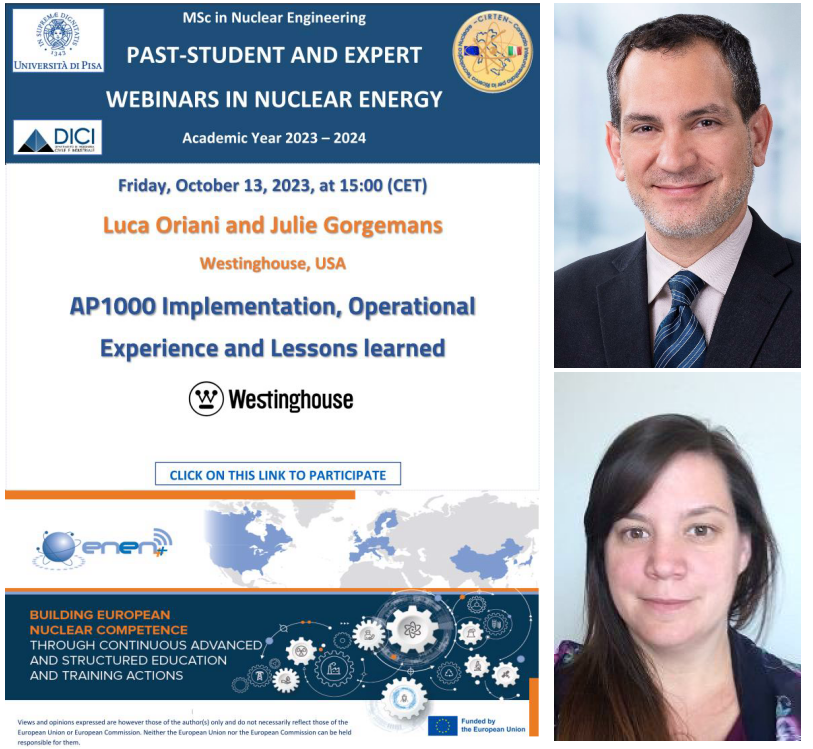
Dr. Luca Oriani has held the position of Global Chief Engineering Services Officer and Senior Vice President for Engineering Services for Westinghouse Electric Company, LLC, since June of 2019. He is responsible for Westinghouse plant and component engineering competencies, methods, tools and assets for both operating and new plants, including Westinghouse engineering personnel at over 20 main global locations. Previously, Dr. Oriani has held a number of roles for Westinghouse, starting in advanced reactors research and technology in 2002. During his career at Westinghouse, Dr Oriani has been responsible for development of advanced safety analyses methodologies and their licensing and applications in the US and Europe, and between 2013 and 2016 has covered different roles in the completion of the design and completion of the first AP1000 units in China and then the US. Since 2016, Dr. Oriani had responsibility for engineering all Westinghouse new plant projects. His career has been devoted primarily to the development of advanced nuclear systems and advanced safety solutions for nuclear power plants, and he is the author of more than 50 technical papers and reports on these subjects. Dr Oriani is a graduate of the Polytechnic Institute of Milan, Italy, and a fellow of the 1st World Nuclear University Summer Institute.
- EDUCATION:
- 5-year Laurea (M.S.) in Nuclear Engineering, Polytechnic Institute of Milan, 1997
- Doctorate in Nuclear Engineering, Polytechnic Institute of Milan, 2001
Julie Gorgemans joined Westinghouse in 2005, developing nuclear systems solutions in support to safety improvement projects and power uprating programs on European pressurized water reactors. She then joined the Westinghouse new plant division in 2008 which she supported until 2017, working on the development and International deployment of the AP1000 plant. During these years, Julie worked on the finalization of the AP1000 passive safety systems, contributed to several proposal developments for European customers, and spent four years in the UK working on the Generic Design Assessment of the AP1000 plant by the UK safety authorities and the development of the AP1000 Moorside project. From 2017 until early 2021, she focused on the support to European pressurized water reactor customers as a product manager for the nuclear island engineering services, with a focus on long term operation. In 2021, she returned to support Westinghouse new plant division and provides technical leadership for new plant business and bid proposal development in Europe. She recently became Senior Project Engineering Manager as she took on the additional role of leading the AP300 design development program.
- EDUCATION:
- M.S. degree in Physics Engineering, Université Libre de Bruxelles, 2005
- M.S. degree in Business Administration (MBA), University of Manchester, 2019
________
Webinar by Claudia Gasparrini on Friday October 20, 2023 at 15:00
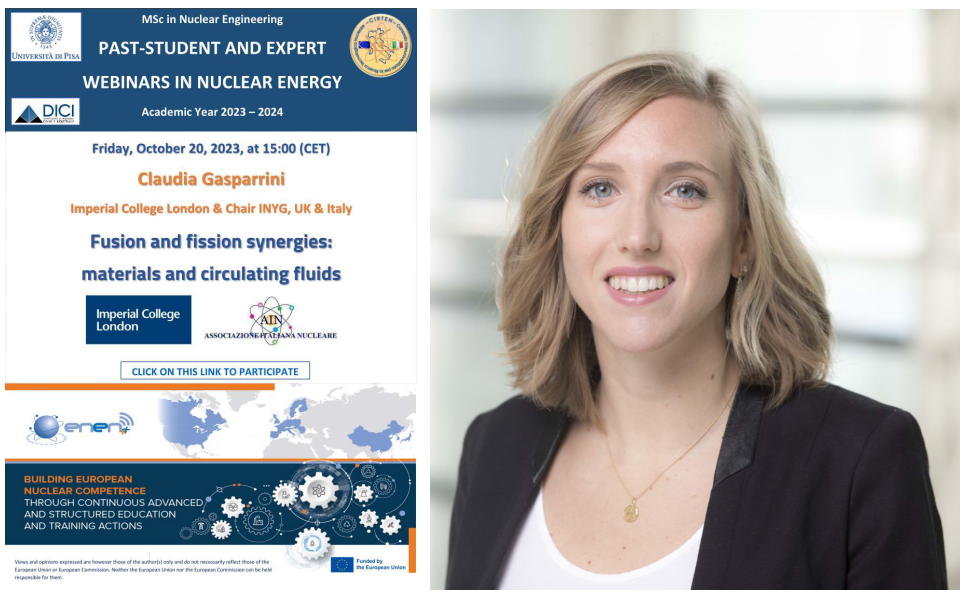
________
Webinar by Mihaela Bacalum on Friday October 27, 2023 at 15:00
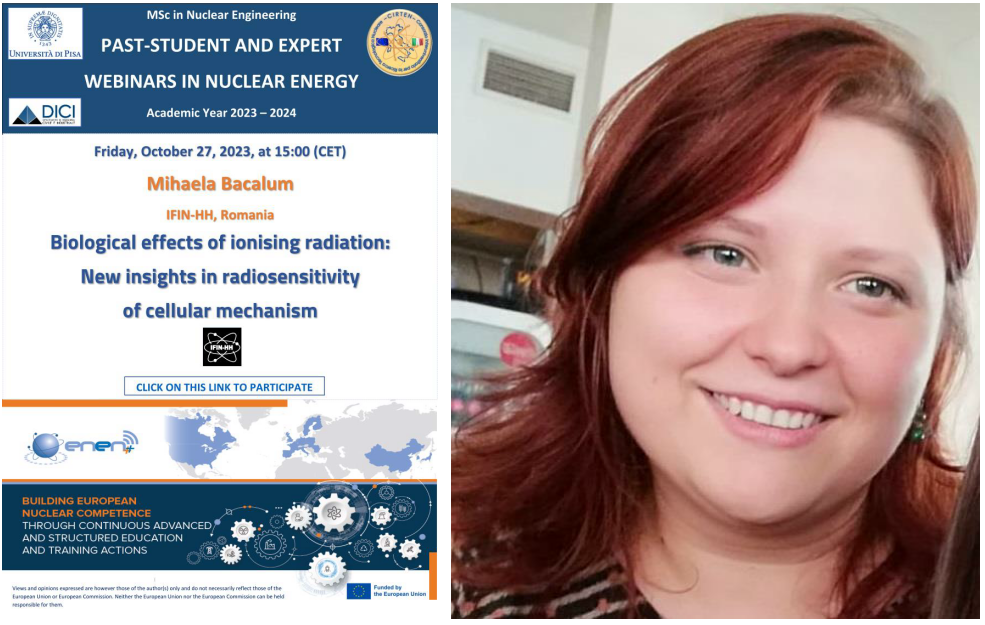
Mihaela Bacalum has over 15 years of experience in cellular biophysics and biology gained working in the Department of Life and Environmental Physics from Horia Hulubei National Institute of Physics and Nuclear Engineering (IFIN-HH). In 2009 she got a M.Sc. in Neurobiology and in 2013 a Ph.D. in Biophysics and Biomedical Sciences. Her areas of expertise include lipid membrane interactions, evaluation of antimicrobial compounds efficiency in vitro, evaluation of anticancer compounds efficiency in vitro against 2D and 3D (spheroids) cell cultures, and in vitro cellular radiobiology of cells treated with low energy proton beams. She is the author of more than 50 articles and over 60 international communications. She is a scientific advisor of more than 20 undergraduate and master students and 3 PhD students. Presently she is the Head of Department of Life and Environmental Physics from Horia Hulubei National Institute of Physics and Nuclear Engineering (IFIN-HH).
________
Webinar by Ahmed Bentaib on Friday November 3, 2023 at 15:00
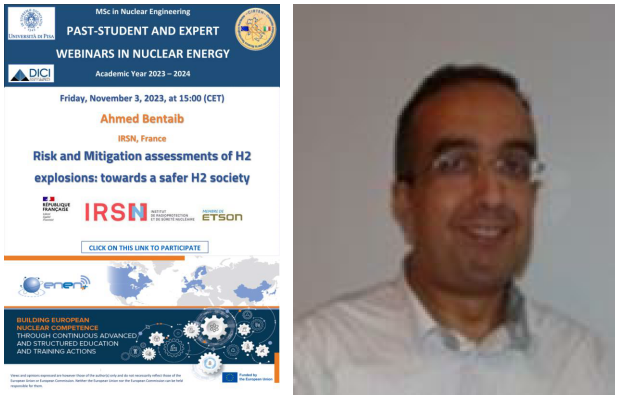
Ahmed Bentaib is an expert on nuclear safety in IRSN since 2000. He received his Ph.D. from Lyon University in 1993 and the Accreditation Diploma to Supervise Research (HDR), from the University of Orléans in 2020.
His research interests cover Severe Accidents, modeling of hydrogen dispersion, mitigation and combustion phenomena pertinent to safety of nuclear and industrial facilities. As a result of his research, he is published more than 100 papers in refereed journal and international conferences.
During his career, Ahmed BENTAIB has contributed to several national, European, OECD and IAEA projects. After more than 20 years of professional career, he is Vice-Chair of the OECD-NEA Working Group on Analysis and Management of Accidents (WGAMA), co-leader of the Technical Area 2 on Severe Accidents of NUGENIA and Chair of the ETSON expert group on severe accident.
Along his career, Ahmed BENTAIB has collaborated in universities, and presently he is lecturer in masters’ courses related to nuclear safety.
________
Webinar by Luca Ferrante on Friday November 10, 2023 at 15:00
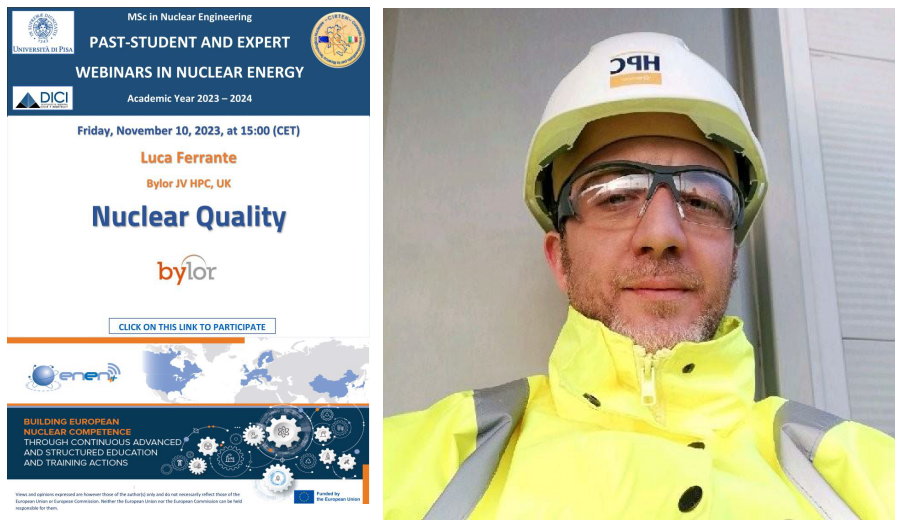
Luca Ferrante graduated from the University of Bologna in Civil Engineering and has over 15 years of experience in management and construction of NPP. His experience in nuclear power began at MO34 for the refurbishment and completion project of the 2 VVER440 (1.654 MW tot), managing the engineering of the convection and the nuclear island and then creating the turnover process of the buildings and the relate systems to commissioning team in order to begin the commissioning and future operations. Luca Ferrante is currently working as a Senior Project Manager for Bylor, (JV between Bouygues TP and Laing O`Rourke), for the construction of 2 EPR at HPC Hinkley Point C (3.2 GW). At HPC has been involved in the manufacturing and assembly of the PTLS scope (pools, tanks, containment liner and sumps) across the 2 units for the Nuclear Island and since the 2021 is in charge of delivery of the HLs safety building, managing the civil works and the coordination of MEH installation. In parallel, Luca is actively involved with Bologna and Roma University running workshops regarding Nuclear Quality and Management of Nuclear construction.
________
Webinar by Gianfranco Caruso on Friday November 17, 2023 at 15:00
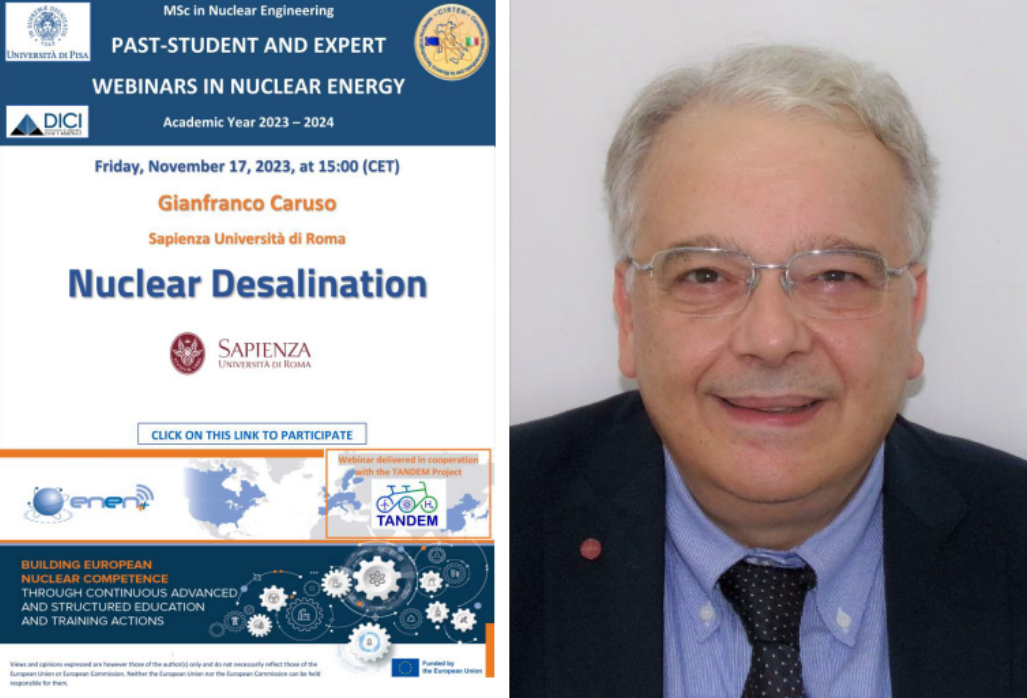
Gianfranco Caruso is Full Professor in Nuclear Engineering at Sapienza, University of Rome. He received his MS degree in Nuclear Engineering in 1984 and earned his PhD in Energy in 1989, focusing on severe accidents in nuclear plants. He is a member of the Scientific Council of ICHMT and representative member of Sapienza in the Governing Board of CIRTEN. Prof. Caruso is a member of the “National Commission for the Forecasting and Prevention of Major Risks" of the Department of Civil Protection – nuclear and radiological risk subcommittee. He is currently leader of the Sapienza “Nuclear Engineering Research Group” in ongoing national and international projects related to nuclear topics and the reference person for Sapienza research activities in the framework of the EUROFUSION project. His research interests include: advanced heat transfer and thermal-hydraulics in fission and fusion nuclear plants; nuclear safety, magneto-hydrodynamics; two-phases heat transfer and flow; design of components and systems for energy production plants.
________
Webinar by Frédéric Plas on Friday November 24, 2023 at 15:00
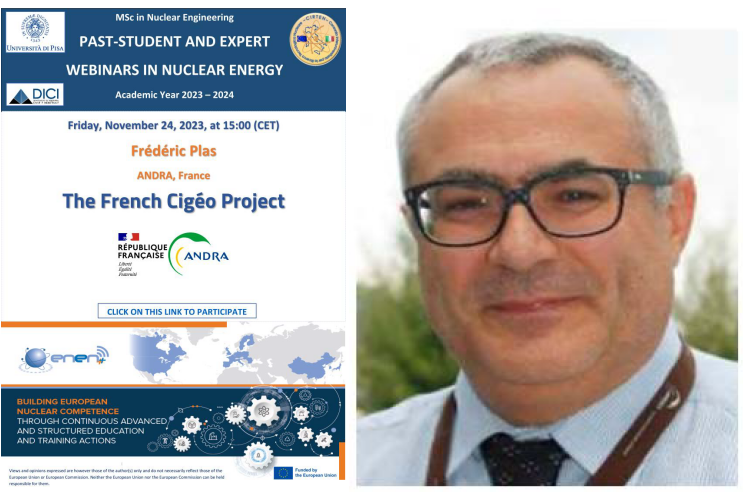
Frédéric Plas is civil engineer in applied geosciences with a higher education diploma in mechanics and hydraulics, Mr. Plas began his career in the 1980s at the CEA in a research laboratory on material for radioactive waste disposal. He joined Andra, the French national agency for radwaste management, in the 1990s in the scientific division. Since more than 30 years, various managing positions allowed Frédéric Plas to become an expert in deep geological disposal of radwaste and radwaste management in general, covering different areas: design concept, safety assessment and Performance Assessment, a wide range of scientific disciplines (geosciences, materials sciences, radiochemistry, applied mathematics...), Spent fuel cycle and radwaste conditioning.
Head of the Research and Development Division of Andra during 10 years since 2022, he is now the head of the Cigéo program division in charge of instruction of Construction licensing application of Cigéo projet (industrial center for geological disposal of most radioactive radwaste), and the programmatic and technical authority for the development of Cigéo projet.
________
Webinar by Han Gyu Joo on Friday December 1, 2023 at 15:00
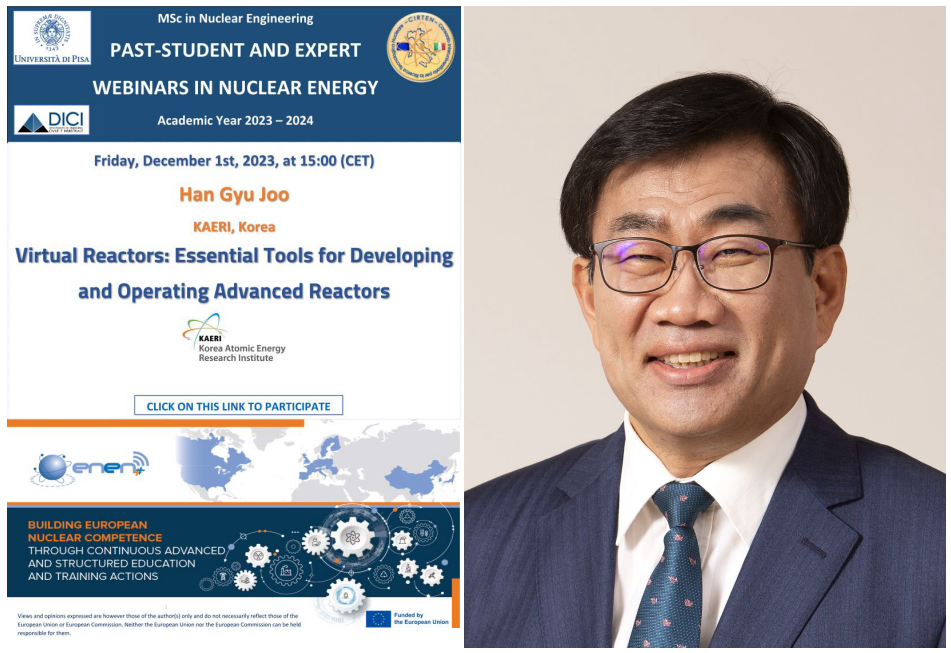
Dr. Han Gyu Joo has been serving as the President of Korea Atomic Energy Research Institute (KAERI) since December 2022. He is on leave from his professorship at Seoul National University where he had served as a Professor of Nuclear Engineering for 18 years. He got his Ph.D. in Nuclear Engineering from Purdue in 1996. During his 4 and half year stay at Purdue including the postdoc period, he developed the initial version of the PARCS (Purdue Advanced Reactor Core Simulator) code which is now being used worldwide through the NRC framework. After returning to KAERI, he led the development of a Numerical Nuclear Reactor based on the DeCART direct whole core calculation code. After moving to SNU in 2004, he broadened his expertise in computational reactor physics and developed many neutronics codes as well as a core thermal hydraulics code with his students. He was inducted as a Fellow of the American Nuclear Society in 2015. He is also an inducted member of the National Academy of Engineering of Korea.
________
Webinar by Jacopo Buongiorno on Friday December 15, 2023 at 15:00
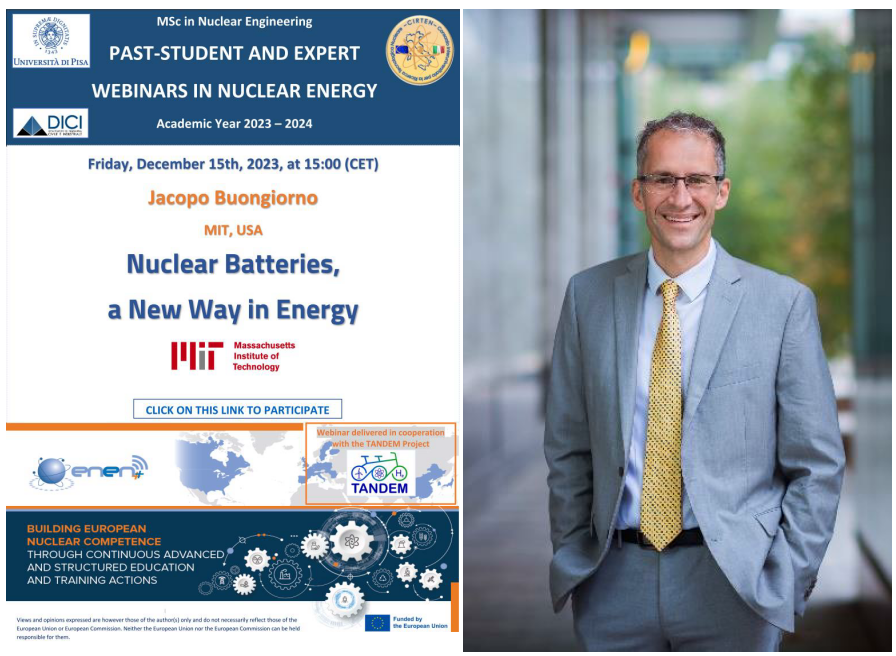
Jacopo Buongiorno is the TEPCO Professor of Nuclear Science and Engineering at the Massachusetts Institute of Technology (MIT), the Director of the Center for Advanced Nuclear Energy Systems (CANES), and the Director of Science and Technology of the MIT Nuclear Reactor Laboratory. He has published over 100 journal articles in the areas of reactor safety and design, two-phase flow and heat transfer, and nanofluid technology. For his research work and teaching he won several awards, among which recently the 2022 ANS Presidential Citation. Jacopo is a consultant for the nuclear industry in the area of reactor thermal-hydraulics, and a member of the Accrediting Board of the National Academy of Nuclear Training. He is also a Fellow of the American Nuclear Society, a Fellow of the NUclear Reactor Thermal Hydraulics (NURETH) conference, a member of the ASME, past member of the Naval Studies Board (2017-2019), and a participant in the Defense Science Study Group (2014-2015).
________
Webinar by Stefano Monti on Friday December 22, 2023 at 15:00
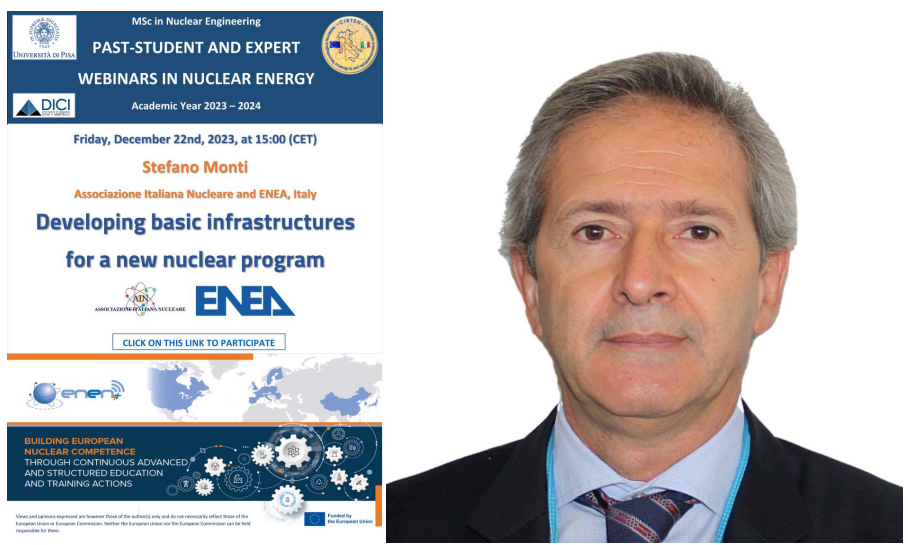
Stefano Monti is currently President of the Italian Nuclear Association and Director of Research at ENEA, the Italian National Agency for New Technologies, Energy and Sustainable Economic Development. From May 2011 to November 2022, he was Head of the Nuclear Power Technology Development Section of the International Atomic Energy Agency (IAEA). Before joining the IAEA, he was Head of the Division Reactor and Fuel Cycle Safety and Security Methods of ENEA and from 2007 to 2013 President of SIET, a world leader company in the experimental tests for the development, testing, qualification and certification of systems and components for the nuclear industry.
________
Webinar by Yves Desbazeille on Friday January 12, 2024 at 15:00
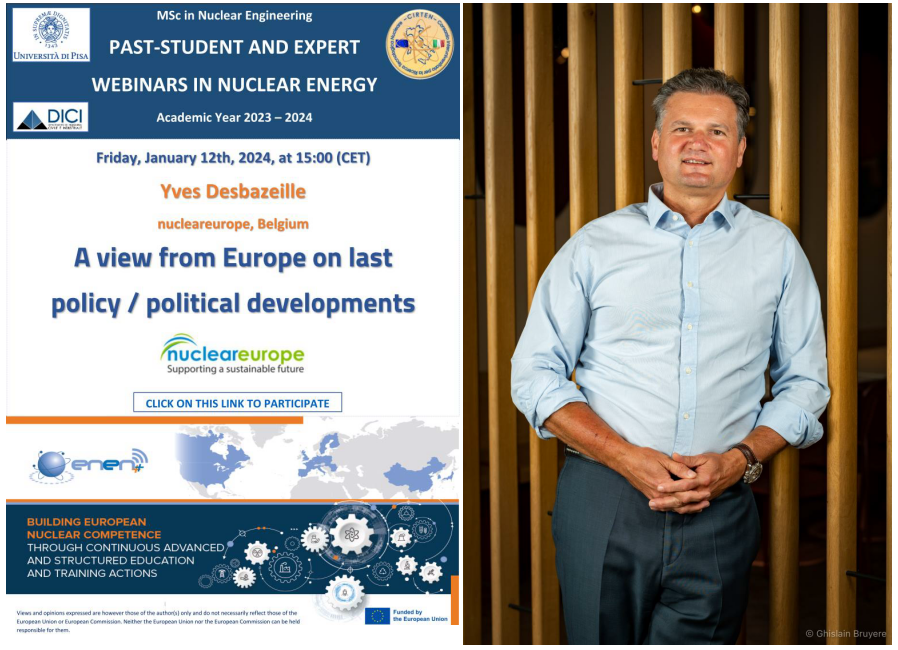
Yves Desbazeille – Director General, nucleareurope
Yves Desbazeille is French and graduated in electrical engineering from the Ecole Supérieure d’Electricité (“SUPELEC”) in France in 1991 and studied on an MBA program in the early 2000s. During his successful career, he has been involved in different businesses and responsibilities at EDF: nuclear engineering, hydro and thermal power projects management in France, USA as well as in Asia, where he was for 5 years. His previous position as EDF representative for energy in Brussels has provided him with an in-depth knowledge of the EU institutions and Brussels’ stakeholders and of the energy and climate stakes for Europe.
nucleareurope is the Brussels-based trade association for the nuclear energy industry in Europe. nucleareurope acts as the voice of the European nuclear industry in energy policy discussions with EU institutions and other key stakeholders. The membership of nucleareurope is made up of 15 national nuclear associations.
________
Webinar by Jeff Lane and Tommy Moore on Friday January 19, 2024 at 15:00
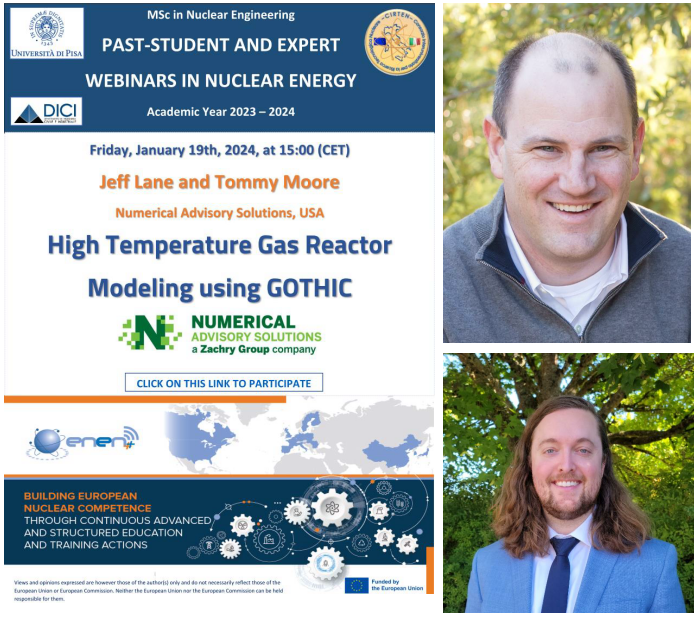
Dr. Jeff Lane is the Technical Director for Numerical Advisory Soluons (NAS). His background is in software development, computaonal thermal-hydraulics and reactor safety analysis for both exisng LWRs as well as next generation SMR and non-LWR concepts. His primary responsibility is the GOTHIC coarse-grid CFD software, but he has also been involved with development of digital twins, the application of machine learning to guide simulaons, accident management and data-driven modeling. Dr. Lane received his Ph.D. from Pennsylvania State University where he studied under the Rickover Fellowship Program in Nuclear Engineering.
Dr. Tommy Moore has 10 years of experience in the nuclear field with a focus on experimental and computational thermal hydraulics, computational fluid dynamics, reactor safety analysis, and reactor design. Dr. Moore recently earned his PhD in nuclear engineering from Oregon State University where he worked on the High Temperature Test Facility as a test engineer, taught the introductory thermal-fluids courses, and performed a Star-CCM+ benchmark for a transient sodium-cooled fuel test in support of the Transient Reactor Test Facility restart.
________
Webinar by Gonzalo Jiménez on Friday January 26, 2024 at 15:00
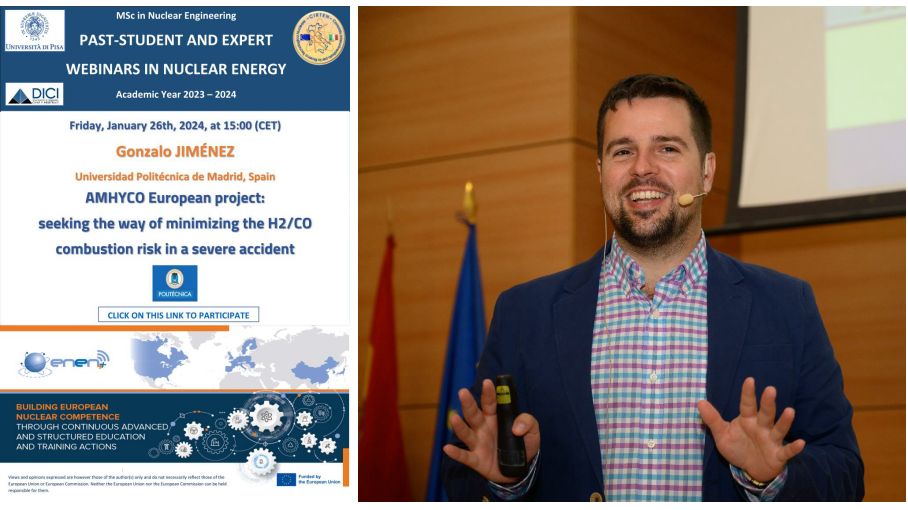
Gonzalo Jimenez has a PhD in Nuclear Engineering by the Universidad Politécnica de Madrid (UPM). He has worked and researched in nuclear safety since 2005 within engineering companies such as Naturgy and Westinghouse Electric Company in Spain and Belgium. From 2011, he is Associate Professor in the Energy Engineering Department of the UPM.
His main fields of research are Nuclear Safety and Thermal Hydraulics, specially spent fuel dry cask simulation and containment analysis. He has worked in several European projects such as ESFR-SMART, ENEN+, PIACE and others. Nowadays, he is responsible of several research projects with Spanish Nuclear Power Plants and with the Spanish Nuclear Regulatory Body. From 2020, he is coordinator of the AMHYCO European project. He has published more that 40 indexed papers and he has directed 7 PhD thesis.
On the other side, he has a Master in Spanish and Latin-American Literature, and he is currently doing a PhD thesis on Spanish contemporary poetry.
________
Webinar by Murthy Kolluri on Friday February 2, 2024 at 15:00
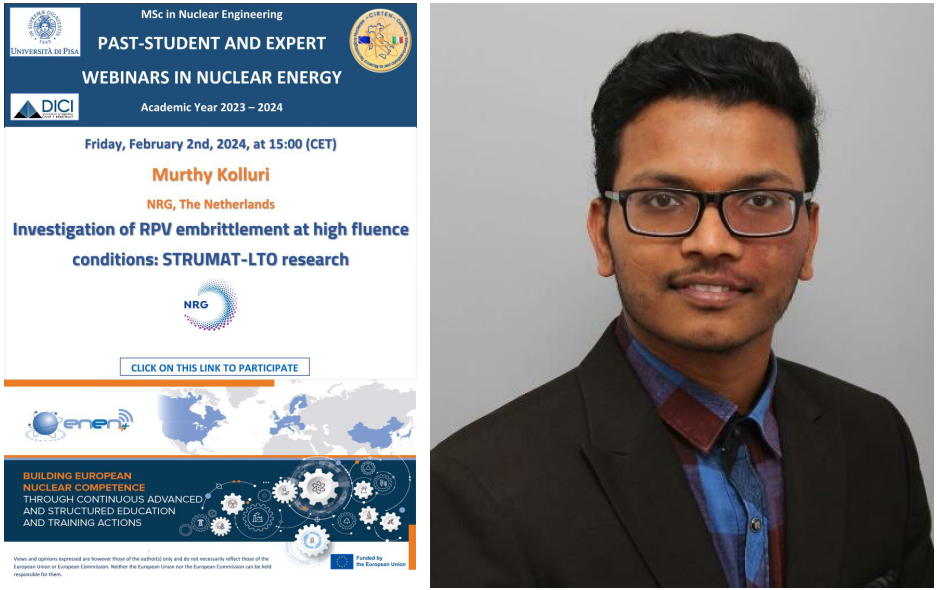
Murthy Kolluri finished his PhD in Mechanics of materials (TU Eindhoven, Netherlands) in 2011. Since then he is working as a research scientist within Research and Innovation department at NRG, The Netherlands. His research interests include neutron irradiation effects on mechanical and microstructural properties of structural nuclear materials, in particular irradiation embrittlement in RPV steels. Additionally, he is involved in surveillance testing program of HFR Petten. He is the project manager and lead scientist of NRG’s multi-annual research program, STRUMAT, focused on studying irradiation embrittlement of RPV steels for safe long term operation of LWRs. He is also scientific coordinator of the STRUMAT-LTO project funded by H2020.
________
Webinar by Lucia Sargentini on Friday February 9, 2024 at 15:00
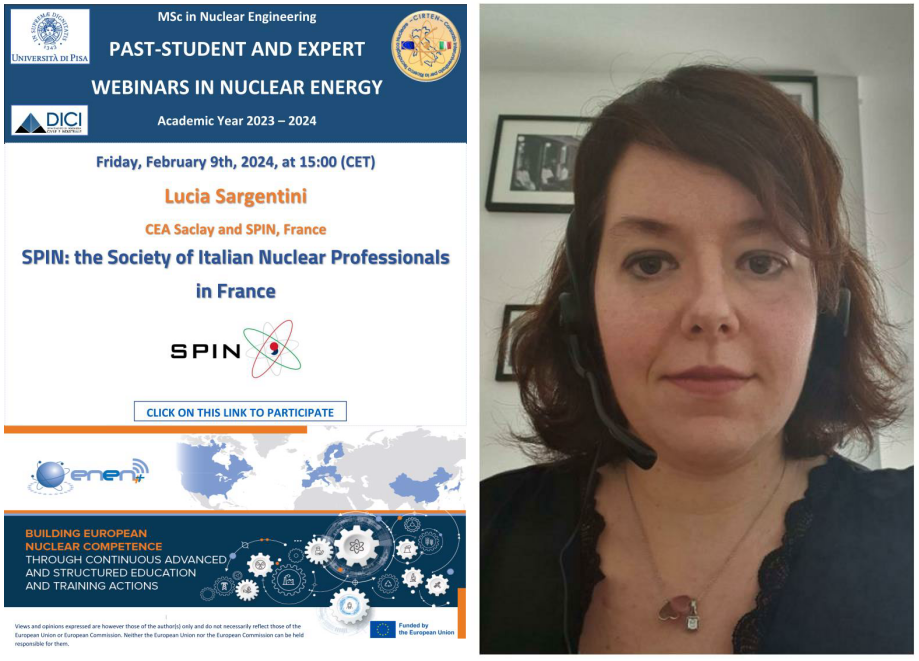
Dr. Lucia Sargentini is a research-engineer at Commisariat à l’Energie Atomique et aux Energies Renouvables (CEA) in Saclay. Since 2015 she has been involved in safety studies for CEA’s research reactors, in experimental analysis for physical modelling and validation of T-H system codes and in the inverse uncertainties quantification in Best-Estimate Plus Uncertainty methodologies. She graduated in Nuclear Engineering at University of Pisa in 2011, after an intership at CEA-Saclay on heat transfer transient during reactivity accident in research reactors. She holds a PhD (2014) in Fluid Mechanics at Université Pierre et Marie Curie (UPMC) in Paris on fluid-structure interaction for sodium reactor assemblies.
Webinar by Filippo Gagliardi on Friday February 16, 2024 at 15:00
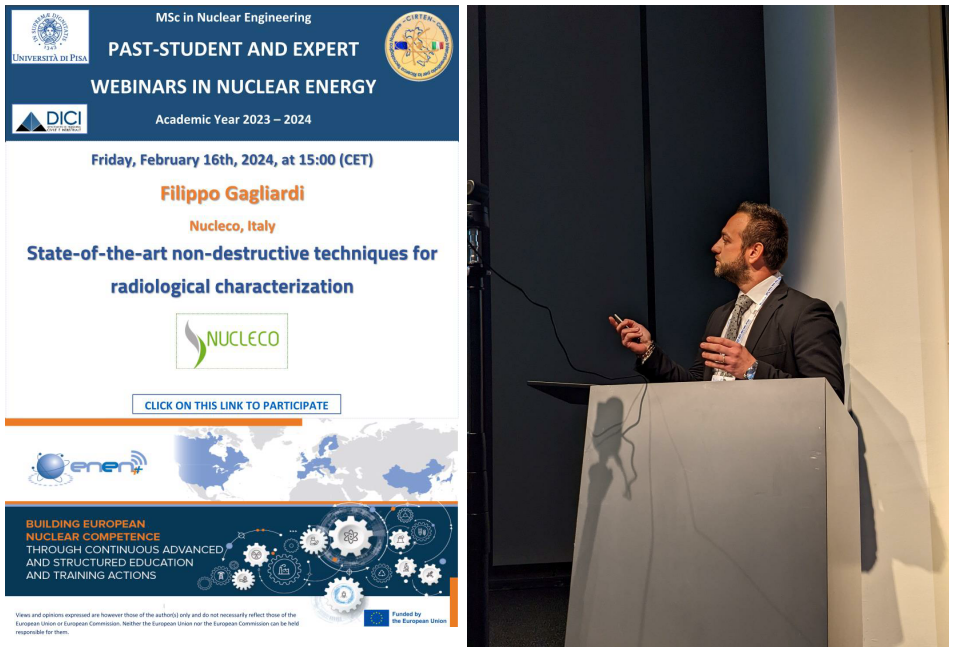
Filippo Gagliardi has a master’s degree in physics of fundamental interactions earned at University of Pisa, Italy, in 2013. After few experiences in high-energy experiments (CMS, AMS) at CERN, he joined the Italian company Nucleco spa. Currently he is responsible of the non-destructive characterisation systems of the company. He has gained a deep experience in practical applications and theorical studies of many non-destructive techniques for radiological characterization in a large variety of cases, in Italy (included, but not limited to, all nuclear installations) and abroad (like the Joint Research Center – JRC – in Karlsruhe, Germany).
He is involved in several international projects and gives lectures and seminars for university courses or for private entities. Since 2021, he is involved (as student) in the PhD programme in nuclear engineering with La Sapienza – University of Rome, Italy: his R&D work focuses in 2D and 3D gamma-ray imaging techniques.
Webinar by Michele Frignani on Friday February 23, 2024 at 15:00
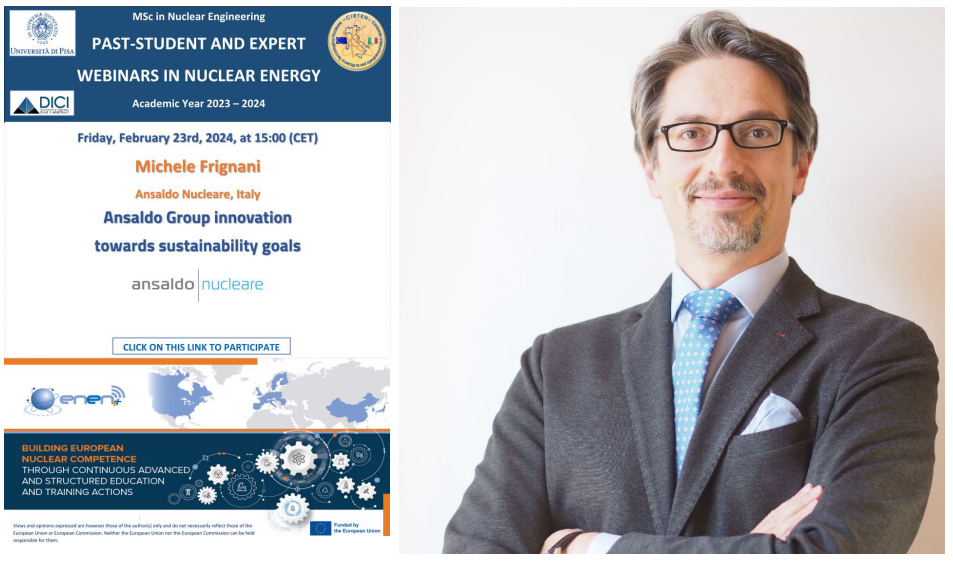
Michele Frignani entered Ansaldo Nucleare in 2007 and is currently Head of Innovation for the nuclear sector. He covered multiple roles in the company, from technical coordination to management responsibilities of increasing complexity. He is now responsible of the strategic plan, including the interface and synergies with the companies of the Group.
With 15+ years experience in the nuclear field and 10+ years in coordination of innovative projects, he devoted most of his carrer in bridging the gap between academia and industrial sector, with a focus on the management of engineering and testing programs for advanced reactor concepts and small modular reactors.
He has a PhD in Nuclear Engineering at University of Bologna, and recently attended the Key Manager High Education program by CdP Academy at SDA Bocconi, Headsprings and IESE Campus. With more than 30 publications in journals, he is also invited speaker at various international events on energy and nuclear technology.
Webinar by Georges Van Goethem on Friday March 1, 2024 at 15:00
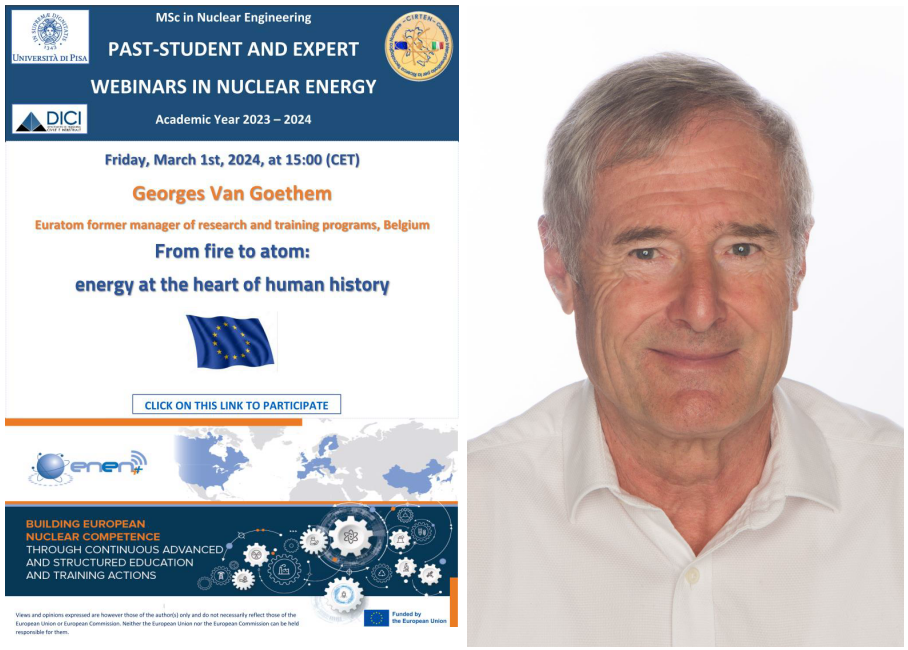
Georges VAN GOETHEM is a mechanical civil engineer (UCLouvain Polytechnic, 1974). He then completed a doctorate in fluid mechanics applied to nuclear safety (1979). He worked for Belgian industry for several years. He then spent his entire career in international nuclear fission research at the European Commission - more specifically at Euratom. He spent the first half of his career at the Joint Research Centre in Ispra, Italy, and then in Brussels at DG Research and Innovation, Directorate for Energy, in charge of the Euratom framework programme (safety, radiation protection, waste management). He has launched a number of nuclear education and training programmes as part of the Erasmus programme.
He also initiated a number of scientific collaborations in Europe and abroad on issues relating to the energy mix (i.e. composed of renewable, fossil and nuclear sources). His teaching at the Collège Belgique (Royal Academy of Belgium) focuses on innovation in the nuclear field (Generation IV and SMRs). He also lectures in France at the Ecole des Mines de Nantes and at the Université de Reims Champagne-Ardenne. Finally, he gives a series of lectures on the energy mix at the Université des Aînés (UDA) of UCLouvain on the campuses of Brussels-Woluwé and Louvain-la-Neuve.
He is also a reviewer of the IPCC reports - in particular, Working Group no 3 (i.e. climate change mitigation) - whose sixth report came out on 4 April 2022. He is a member of the "Académie Royale des Sciences d'Outre-Mer de Belgique". As such, he works on issues relating to "access to energy for all" (SDG no 7) in Africa. In his spare time, he leads various citizens' groups concerned about the future of energy in Belgium. He is co-founder of the bilingual Belgian association "100 Terawatthours", which interacts with citizens, the relevant political authorities and the media.
Webinar by Marco Pellegrini on Friday March 8, 2024 at 15:00
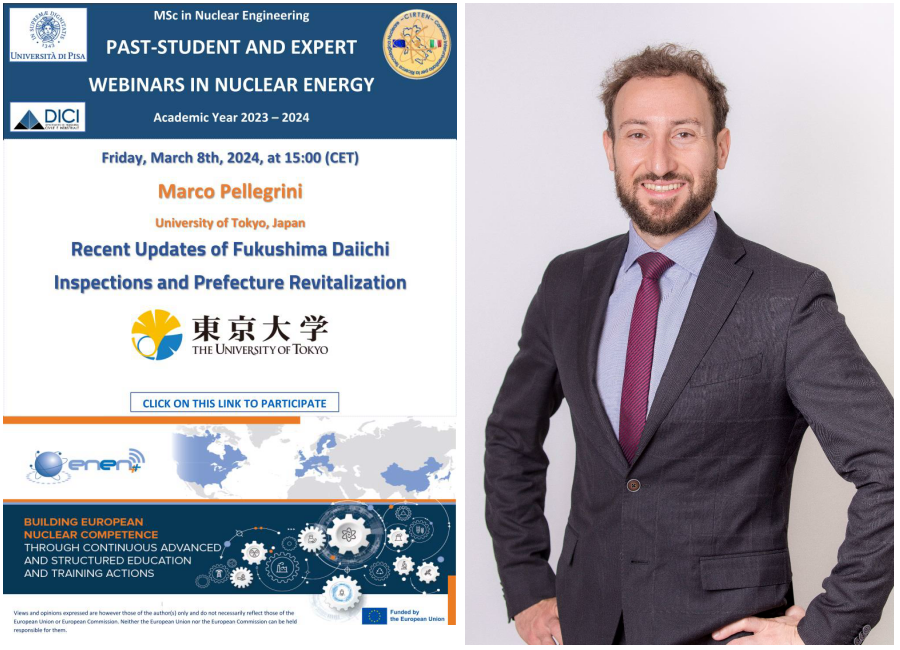
Marco Pellegrini has been working as Project Associate Professor since 2019 in the Nuclear Professional School at the University of Tokyo. Marco obtained his Ph.D. at the Tokyo Institute of Technology in March 2012, almost one year after the accident at Fukushima Daiichi Nuclear Power Station. His research and expertise encompass Severe Accidents phenomenology, focusing on multi-phase flow with Computational Fluid Dynamics (Eulerian-Eulerian method and VOF) and experimental approaches (e.g. PIV, aerosol-spectrometry).
He has worked from 2012 to 2019 for the Fukushima Decomissioning Project as a researcher at the Institute of Applied Energy in support of TEPCO for the investigation of the accident progression, debris and fission product distribution at the plant. He has served as leader and technical expert of various OECD/NEA projects such as the BSAF-I, BSAF-II, ARC-F and currently the FACE project. Additionally, he serves as task leader of the CFD package of the IPRESCA/NEUGENIA project on pool scrubbing.
Webinar by Ramona Bouwman on Friday March 15, 2024 at 15:00
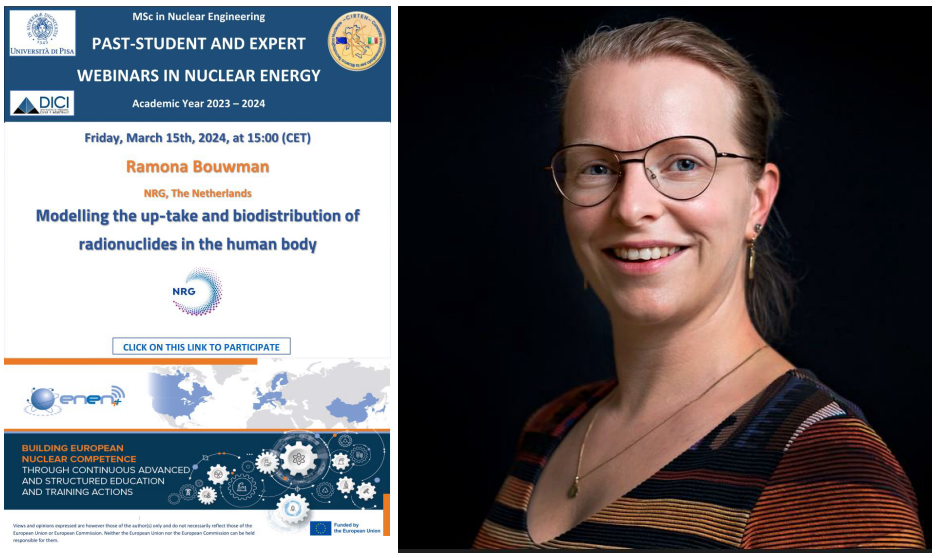
Ramona Bouwman finished her PhD in medical physics (University of Amsterdam) in 2017. Since 2018 she is working as a radiation protection consultant at NRG in Arnhem, the Netherlands. In this postiion she gives advice on regular aspects regarding the safe use of ionizing radiation and she is involved in research on radiation protection questions. Her main research topics are related to the biodistribuon of radionuclides in the human body. Addionally, she is leading the task on internal dosimetry of therapeutic radiopharmaceuticals of working group 7 (internal dosimetry) of the European Radiation Dosimetry Group.
Webinar by Luka Snoj on Friday March 22, 2024 at 15:00
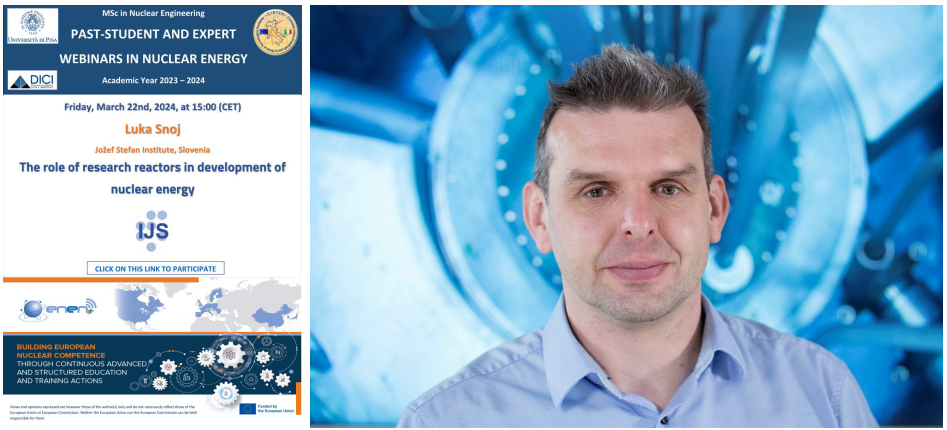
Luka Snoj received the Diploma and PhD thesis in Physics from the Faculty of Mathematics and Physics, University of Ljubljana, Slovenia in 2005 and 2009, respectively. In 2010, he was on 6 months postdoctoral position at Culham centre for Fusion Energy, where he was charge of neutron transport calculations to support JET neutron yield calibration. In 2010 has been appointed head of TRIGA reactor at the Jozef Stefan Institute (JSI). Since 2014 he has been head of reactor physics division at the Jozef Stefan Institute. He is very active in teaching; reactor and radiation physics, experimental reactor physics at the Faculty of mathematics and physics where in 2019 he was elected associate professor. He has been advisor to 13 master and 4 PhD theses and is advisor to 4 PhD students. His research interest is mainly theoretical reactor physics related to practical applications in power and research reactors, in particular: Monte Carlo transport of neutrons and photons in fission and fusion nuclear reactors, integral reactor experiments, criticality experiments and calculations. He regularly performs evaluations and evaluation reviews of critical and reactor physics experiments for International Criticality Safety Benchmark Evaluation Project (ICSBEP) and International Reactor Physics Experiment Evaluation (IRPhE) Project working groups under OECD/NEA.
Webinar by Yannick Le Tonqueze on Friday April 5, 2024 at 15:00
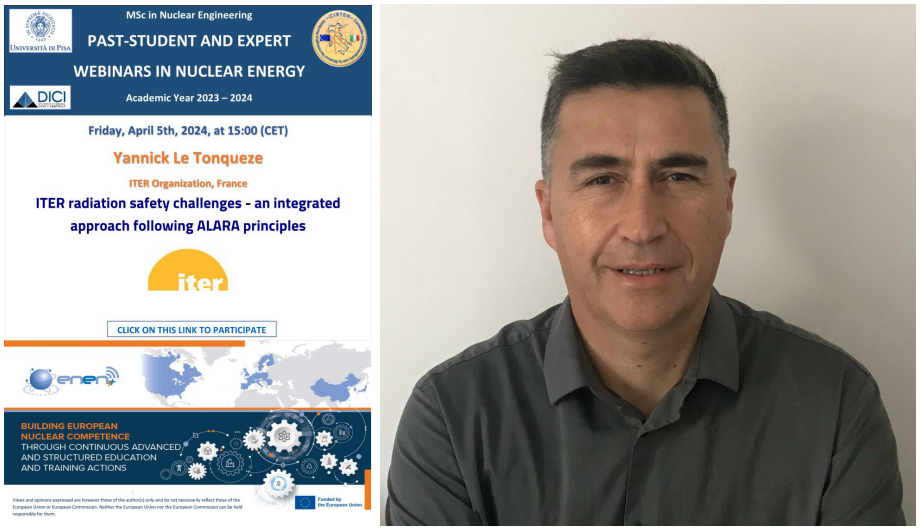
Yannick LE TONQUEZE, 50 years old, got a master´s diploma in Nuclear Engineering from INSTN (France). He joined CEA in 1999 in Research reactors division in Grenoble, during 4 years he managed characterization and dismantling of Reactors diagnostics and irradiation loops, Fission products and tritium labs with on field experience. In 2003, he decided to move in LMJ project near Bordeaux in the CEA military branch. He worked 3 years, as Nuclear Safety engineer, in integrated team with key Companies to develop LMJ systems following strong system engineering approach. Then, he became the Nuclear safety manager for all the project and prepare a major Safety report who was presented to the Nuclear authority. In 2009, he got the opportunity to become IFMIF architect, working with Japanese compagnies, and Nuclear Safety coordinator in Japan during 3 years. Then in 2012, He came back in France in CEA Cadarache to become RES (Nuclear Submarine test facility) deputy Project leader to finalize the facility who is now under operation. Finally he joined ITER in 2016, first in Integration division and quickly ITER DG asked him to be in charge of Nuclear Integration Unit, to manage ITER Radiation safety challenges, who is now the Radiation Safety and Environment Unit that he is leading since 2019.
Webinar by Christian Schönfelder on Friday April 12, 2024 at 15:00
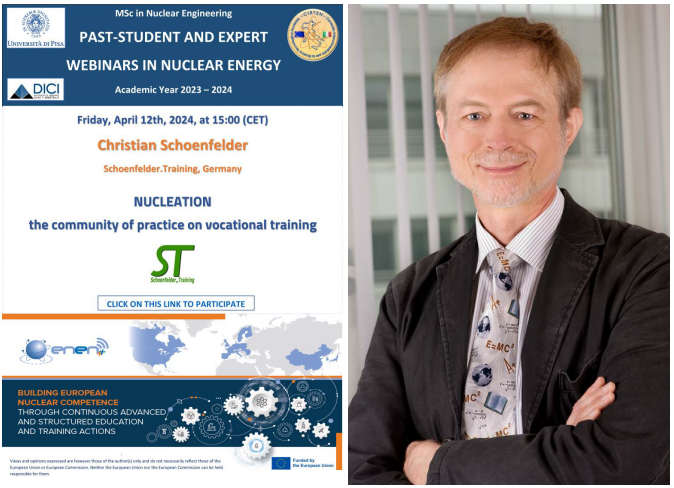
Dr Christian Schönfelder, a theoretical physicist, has more than 25 years’ experience in training of nuclear engineers, nuclear power plant operators, and maintenance personnel, working in companies such as Siemens, Framatome, and AREVA. Amongst others, he was responsible for designing and implementing the comprehensible training program for the operation and maintenance staff of OL3, the EPR that recently started its commercial operation in Finland. For several years now he has been working as a Senior Training Consultant, active in particular in nuclear Education and Training projects funded by the European Union.
As the German AREVA training center manager, he not only was the member of a community of practice of German training center managers, but also nourished the relation, cooperation and communication between the different AREVA internal training centers as well as the national HR departments.
Currently, in the project ENEN2plus (Building European Nuclear Competence) Christian is managing work package 4: Development of Sustainable Vocational Training Program and Network. Here, one task deals with the creation and operation of a community of practice on vocational training.
Christian is not only a member of the German (KTG) as well as of the Spanish Nuclear Society (SNE), but also a member of ENEN (European Nuclear Education Network) as well as of FuseNet, the European Fusion Education Network. Furthermore, in the Management Board of the Fusion Industry Innovation Forum that consults the European Commission, he is responsible for the topical area Skills Development.
Webinar by Dominique Bestion on Friday April 19, 2024 at 15:00
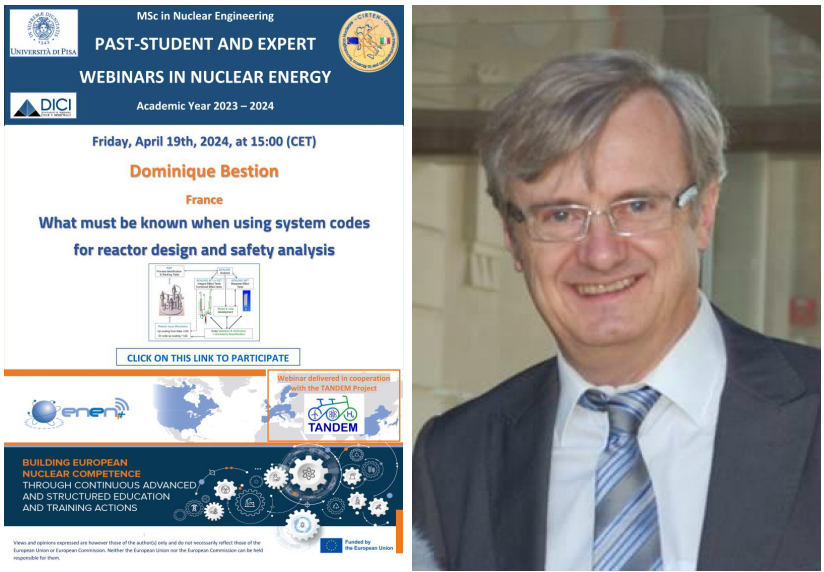
Dr Dominique Bestion has been working at Commissariat à l’Energie Atomique for 37 years (1983-2020), in a thermal-hydraulic department at CEA-Grenoble, in France. He has been working in modelling two-phase flow for the CATHARE system code for accidental transient simulations and has been project manager of the CATHARE code development. He analysed many experiments and developed several models. He became Research Director and International Expert in reactor thermalhydraulics. He contributed to many European projects and had a coordination role for the EUROFASTNET, NURESIM, NURISP, and NURESAFE projects for a European multiscale thermalhydraulic simulation platform. He had teaching activities in several Universities and international courses and published chapters of books. He contributed to OECD-NEA-CSNI-WGAMA activities, coordinated Task Groups on application of CFD to Nuclear reactor safety and co-founded the biennial CFD4NRS workshops. He contributed to OECD-CSNI State of the Art documents on Scaling, and on 3D system code modelling. He has been Editor at the Nuclear Engineering and Design Journal (2008 to 2021). He has been nominated ’’NURETH Fellow’’ in 2017. He is now consultant, scientific advisor and he chairs the FONESYS international network of system code developers to further improving the quality of reactor thermalhydraulic simulation. His domain of expertise includes two-phase thermalhydraulics, model development, code development and validation, application methodologies of codes for reactor transient analyses and nuclear safety.
Webinar by Koroush Shirvan on Friday April 26, 2024 at 15:00
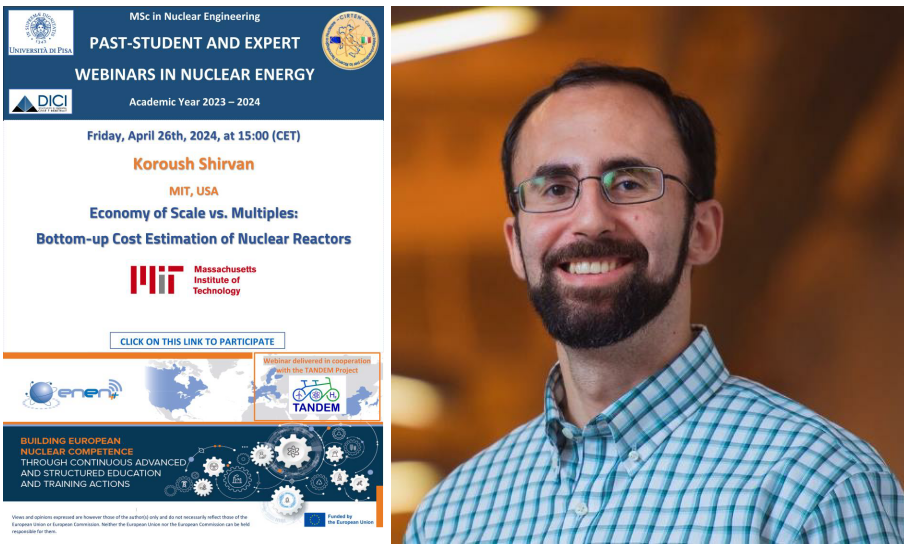
Pr. Koroush Shirvan is a professor of nuclear science and engineering at Massachusetts Institute of Technology and the current Co-Director of Reactor Technology Course for Utility Executives by National Academy for Nuclear Training, Director of Accident Tolerant Fuel Integrated Research Project (IRP) and PI of MIT ARC-20 project as part of the Advanced Demonstration Reactor Program. His research focuses on innovations in reactor design and fuel engineering.
In 2021, Prof. Shirvan released the first open-source tool for cost estimation of existing and advanced nuclear architectures. The tool and its insights are currently utilized by policy makers and energy community worldwide. He is an active consultant to the nuclear industry on matters of digital engineering, cost, safety, use of AI/ML, and fuel technology.
Pr. Shirvan received his PhD from MIT in 2012. He has been the lead supervisor of over 50 graduate thesis and current is supervising 17 graduate students. His work on fuels has led into multiple awards including the Reactor Technology Award from American Nuclear Society in 2022.
Webinar by Giorgio Simonini on Friday May 3, 2024 at 15:00
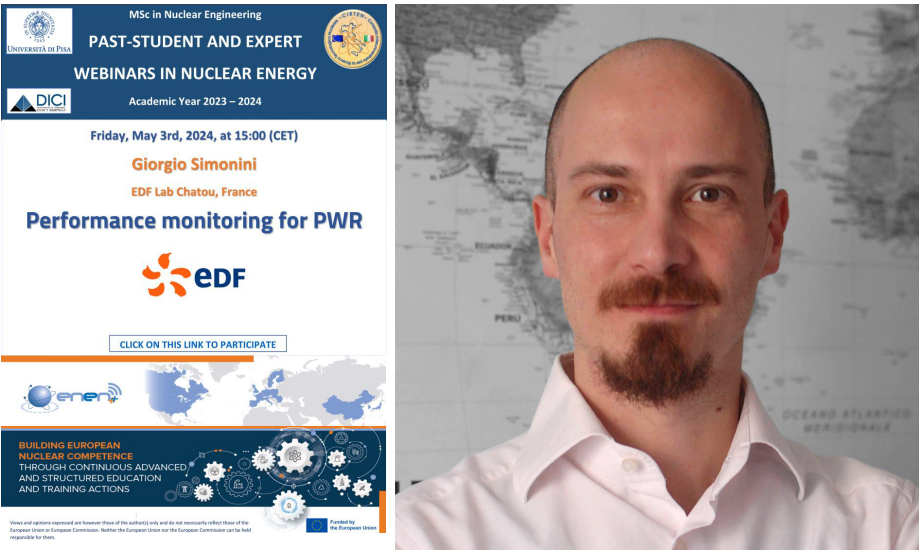
Giorgio Simonini joined EDF R&D as Research Engineer in 2015. Since then, he has been involved in a multitude of projects whose leitmotif is improving the techno-economic performance of existing and future nuclear power plants (SMR, EPR2). Its expertise is focused on thermal-hydraulic modeling at a system level (i.e. 0D/1D modeling; he is one of the main contributors to the development of the Modelica library ThermoSysPro) and on processing of experimental data coming from the nuclear fleet (visualization, statistics, machine-learning). Digital twins, secondary chemistry monitoring, efficiency monitoring, passive safety systems, core flexibility, hydrogen, coupling of AI and physical models are some of the topics on which Giorgio contributes. He also animates some training at EDF or at the INSTN.
Giorgio graduates in Energy Engineering at the University of Pisa in 2008, after a internship at Westinghouse Nuclear (USA) on CFD analyses on the IRIS SMR. He pursued his specialization in the nuclear domain with a PhD at the CEA-Cadarache on the tempo-spatial representativeness of specific experimental data for a nuclear physics code validation. He also worked at Framatome on the development of new simulation tools for Safety Studies.
Webinar by Bogdan Buhai on Friday May 17, 2024 at 15:00
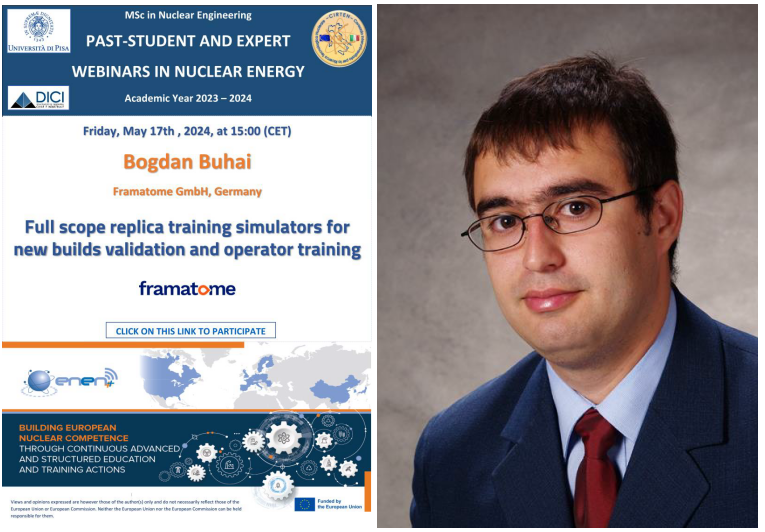
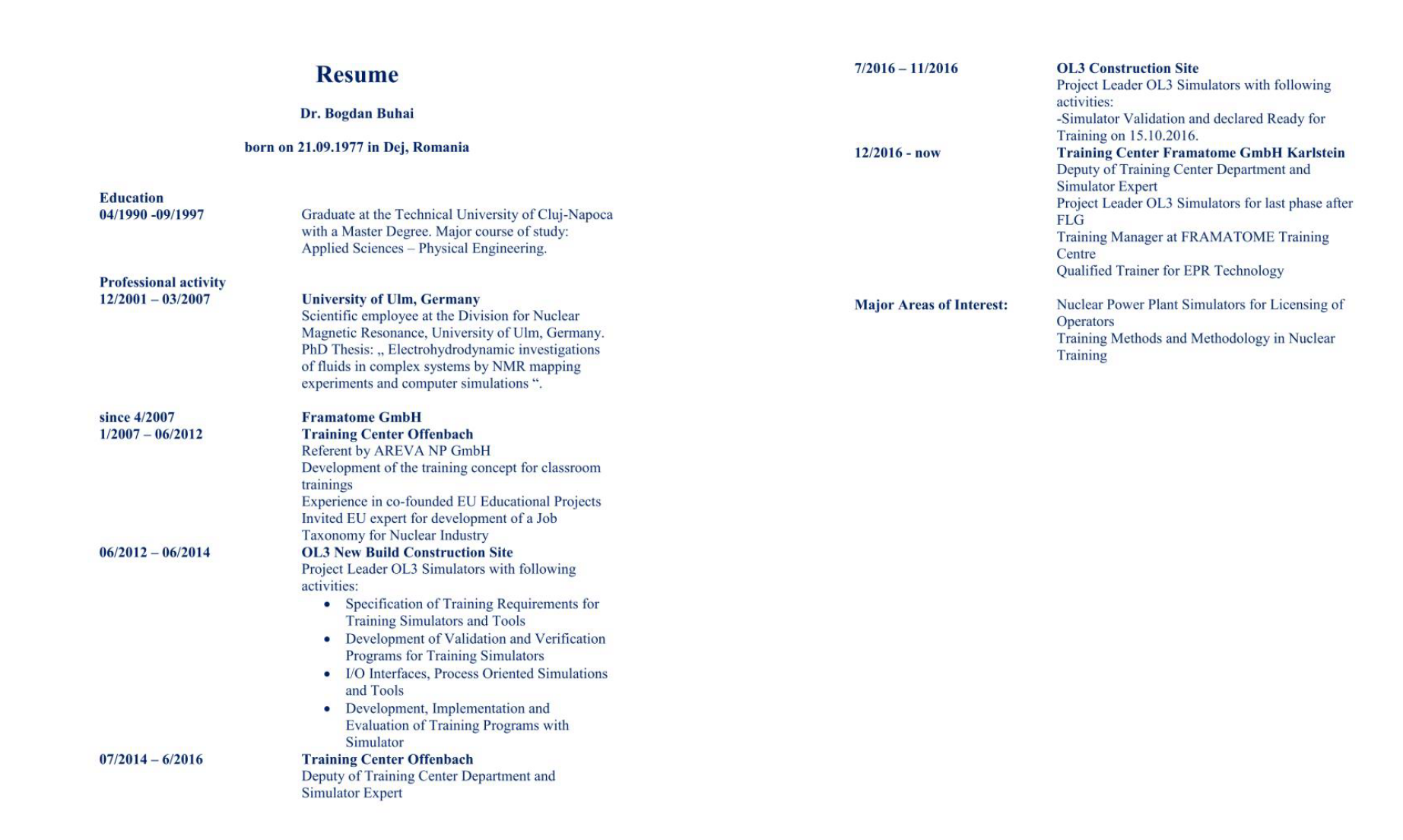
Webinar by Lorenzo Stefanini on Friday May 24, 2024 at 15:00
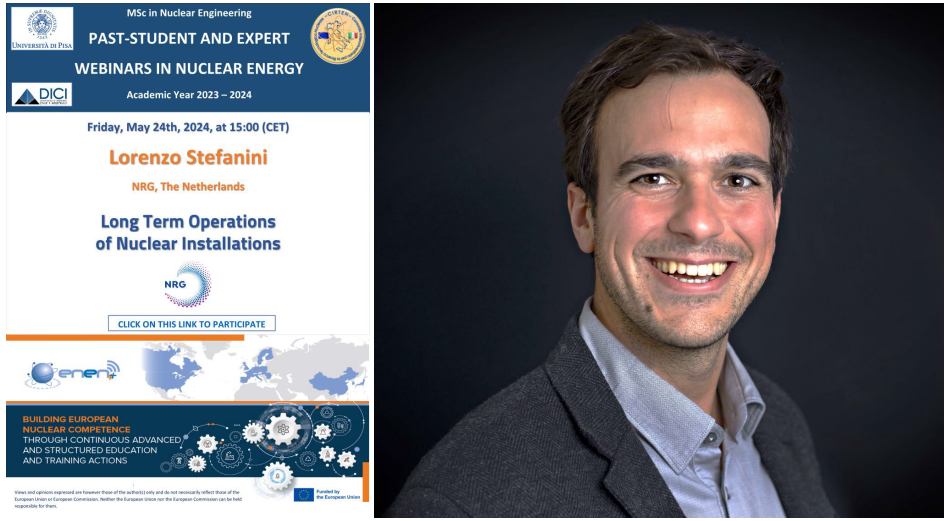
Lorenzo Stefanini is a former student of the Università di Pisa. Currently he holds the role of manager and main business developer for the Ageing Management and Long Term Operation division at NRG (AM|LTO), the Netherlands.
After a bachelor (2013) and MSc (2015) in Nuclear Engineering at UNIPI Lorenzo joins NRG (2016) as a consultant. At NRG Lorenzo rapidly develops into project management and team management. Over the years he takes over the roles of project manager, maintenance manager at the High Flux Reactor and ultimately team manager for the AM|LTO unit.
A recognized specialist in the field of Ageing Management (AM), since 2021 Lorenzo participates and leads may IAEA AM-related and initiatives all over the world.
Webinar by Andrea Alfonsi on Friday May 31, 2024 at 15:00
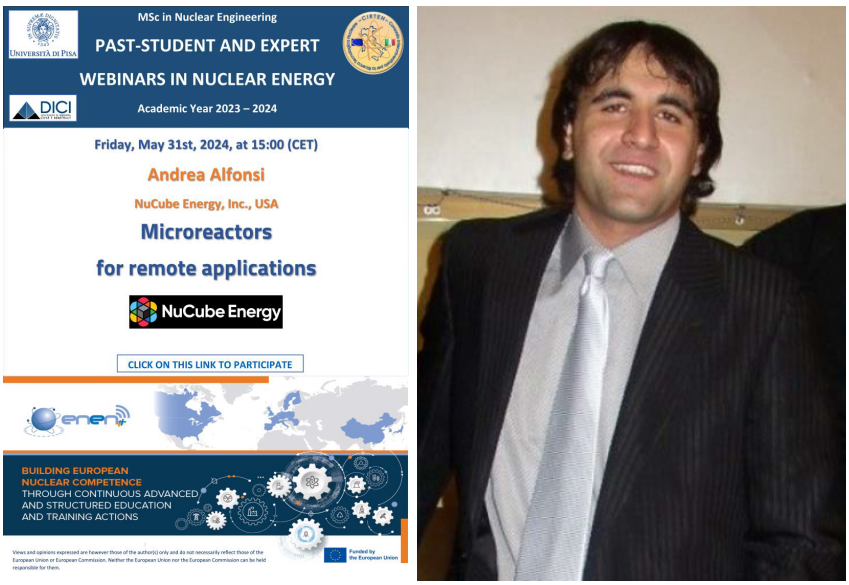
Andrea Alfonsi joined NuCube Energy, Inc. in 2023 and he is currently serving as the Nuclear Core Design Manager. Previously (2021-2023), he was the Nuclear Design and Analysis Functional Manager at Ultra Safe Nuclear Corporation (USNC), in its Advanced Technology division, managing a large multi-disciplinary team of engineers focused on the design and development of nuclear technologies for space applications. Before joining USNC, he worked at the Idaho National Laboratory (INL) for 10+ years (from 2010) covering multiple technical roles, including serving as Technical Leader and Principal Investigator for the development of the Uncertainty Quantification (UQ), parameter optimization and AI-aided Probabilistic Risk Assessment (PRA)code RAVEN (Risk Analysis and Virtual ENvironment) and the Reactor Physics/Neutronics toolkit PHISICS (Parallel and Highly Innovative System for INL Code System).
With 15+ years of experience in the nuclear field (in both Research and Industry environments), he has been involved in research and development of several projects, spanning from reactor design and analysis to methods development for reactor physics applications, reduced order physics/models, advanced uncertainty quantification, etc.
He has a Ph.D. in Energy (Nuclear) Engineering by the University of Rome “La Sapienza” (Italy). In his career, he authored and co-authored more that 20+ journal publications, 60+ papers in proceedings of international conferences, and 40+ technical reports.
Webinar by Carl W. Myers on Friday June 7, 2024 at 15:00
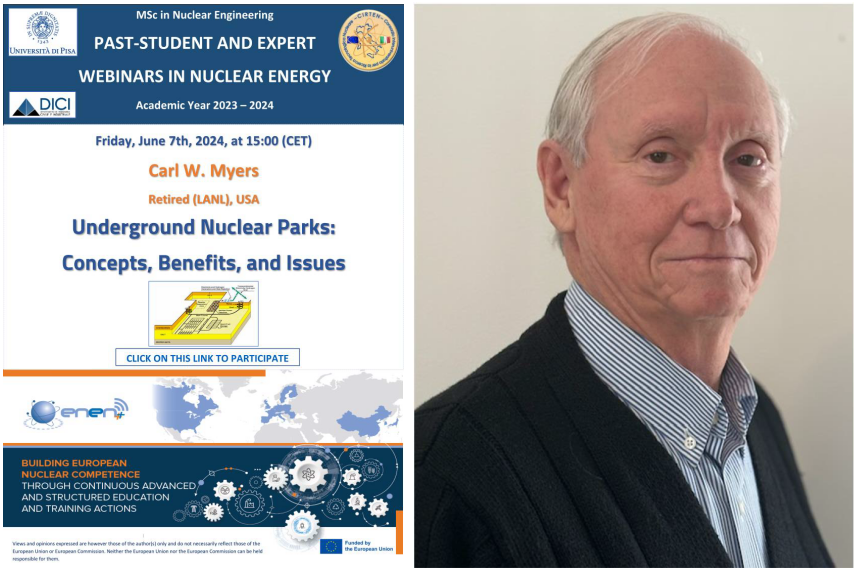
C. W. Myers is an applied geologist with a long-standing interest in underground space applications. He worked for 24 years at Los Alamos National Laboratory in positions that included leader of the geology group, leader of the Earth and Environmental Sciences Division, and co-leader of Los Alamos research for the Yucca Mountain Project. He retired in 2005 to work as an independent researcher. He originated the concept for the underground nuclear park, a method to co-locate underground nuclear power plants and the back-end nuclear-fuel-cycle facilities supporting those power plants, as well as the concept to co-locate underground nuclear power plants with underground hydropower plants. He is a Fellow in the Geological Society of America, a member of the American Nuclear Society, and a member of the International Society of Rock Mechanics "Commission on Underground Nuclear Power Plants.” He completed his Ph.D. in Earth Sciences at the University of California, Santa Cruz in 1973 and a Post-Doctoral Fellowship at the State University of Stony Brook in 1974.
--------
Webinar by Elizabeth Worsham on Friday June 21, 2024 at 17:00
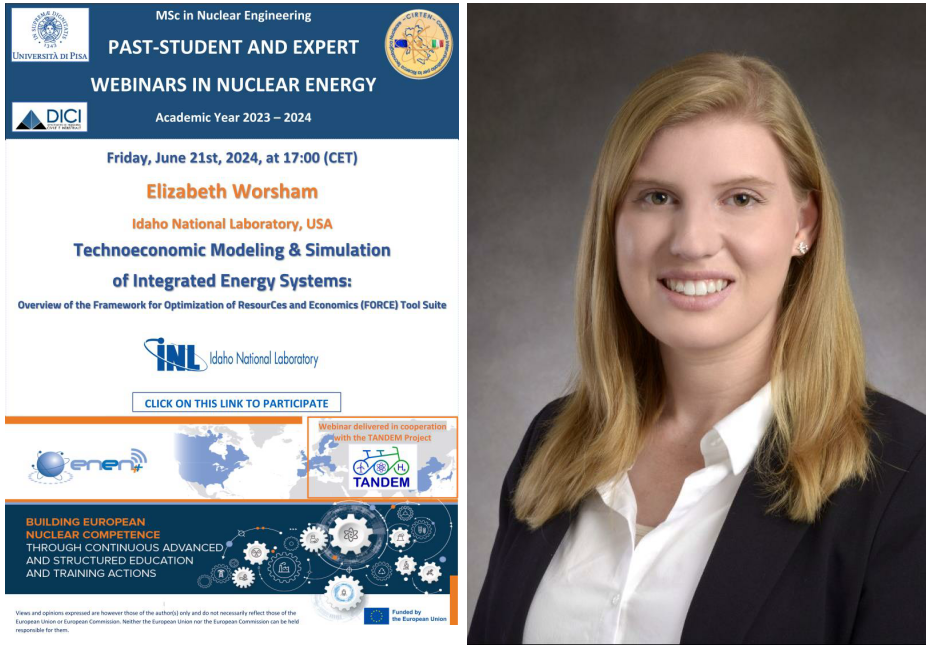
Dr. Elizabeth Worsham is a Systems Integration Engineer at Idaho National Laboratory in Idaho Falls, Idaho. Her work includes modeling and analysis of nuclear heat and power systems and economic analysis of power and product markets. Elizabeth supports the lab’s efforts decarbonize the industrial heat and power sector through integration of advanced reactors and SMRs. Specifically, she leads the group investigating decarbonizing pulp and paper mills with nuclear energy. In addition, Dr. Worsham supports international collaborations through the Department of State’s Foundational Infrastructure for the Responsible use of SMR Technology (FIRST) as a subject matter expert on non-electric applications for nuclear power. Elizabeth received her bachelor’s degree in mechanical engineering from Embry-Riddle Aeronautical University (2017) and PhD in Mechanical Engineering from North Carolina State University (2020).
--------
Webinar by Francesco Ganda on Friday June 28, 2024 at 15:00
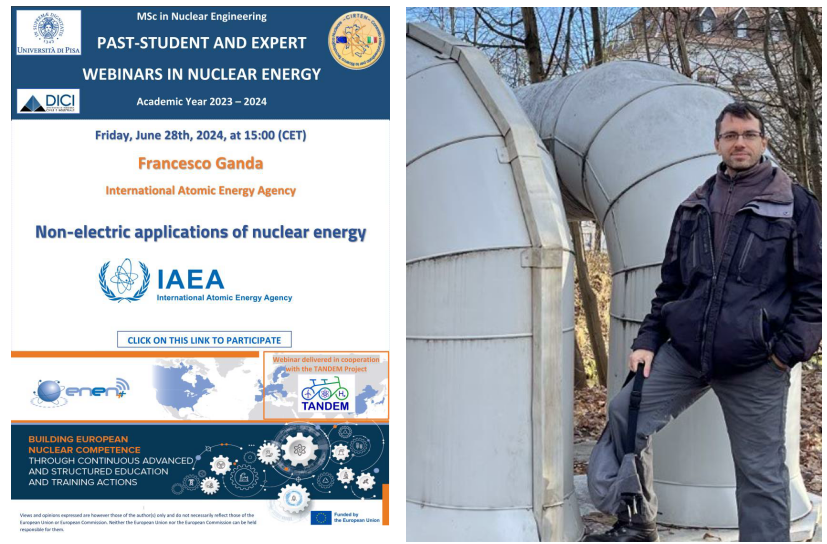
Francesco Ganda currently leads the non-electric applications project at the IAEA. The project helps MS with using nuclear plants for things other than electricity, including hydrogen production, district heating, desalination, industrial uses of nuclear heat etc. Prior to that, as a nuclear engineering expert in the IAEA INPRO section, Francesco developed the IAEA FRAMES model to assess integrated nuclear and renewable in modern electricity systems. Before joining the IAEA, Francesco spent a decade in the US National Laboratories, performing neutronic evaluations of advanced reactors and leading the nuclear economics research activities of the US Department of Energy, as part of the programmatic efforts of the system analysis and integration campaign. He holds a PhD and MS in nuclear engineering from the University of California, Berkeley.
LOOK at an Excerpt of Moments from the Event
Working in the Nuclear Field. A Career Event
Inteviews from the Career Event
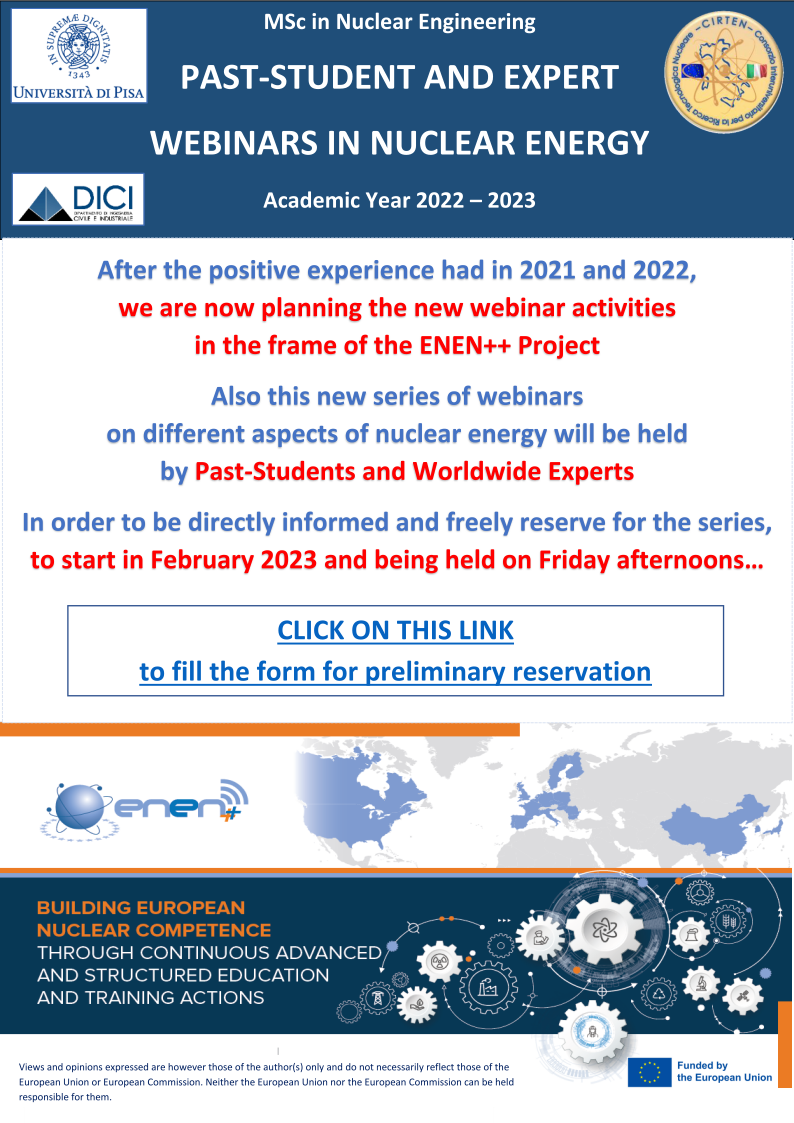
LIST OF WEBINARS FOR THIS YEAR
Webinar by Gabriel Pavel and Roberta Cirillo
on Friday February 10, 2023 at 15:00
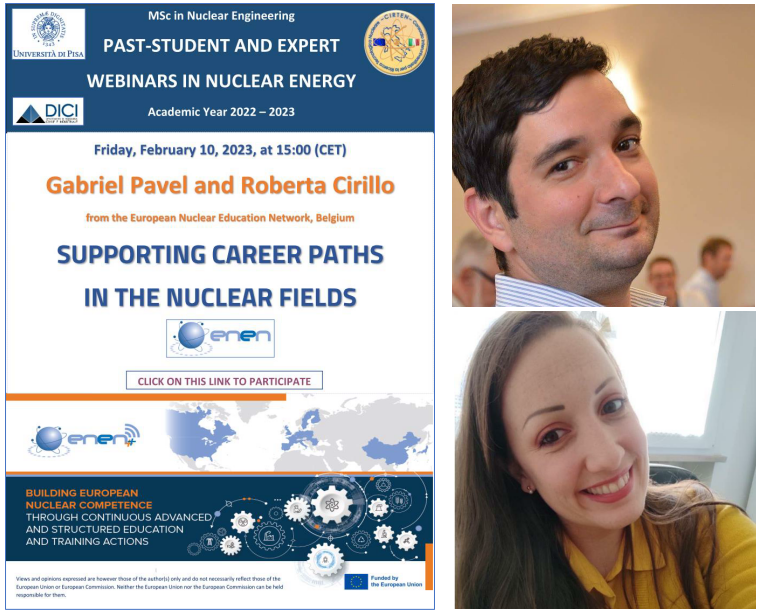
Gabriel Pavel is currently working as Executive Director for the European Nuclear Education Network (ENEN) and also as an assistant professor at University „Politehnica” of Bucharest department of Nuclear Engineering. He finished Faculty of Power Engineering in 2004, Nuclear Power Plants and followed by a Master degree in nuclear engineering. He started working at the University in the same year and also did his PhD in the same period. During 18 years of activity he followed several specialization courses in Research Centers and Universities from Austria, Czech Republic, France, Hungary, Romania, South Korea and Slovakia. He is board member of AREN, Romanian Association for promotion of Nuclear Energy. He is involved in various projects funded by the European Commission and Cohesion funds dedicated to Human Resources and communication in the nuclear field. Since 2018 he is responsible in designing and managing E&T projects ad developing the ENEN’s strategy institutions from mainly Europe but with strong connections with international organizations all over the world. He is directly involved in designing, implementing and managing actions aimed at improving nuclear competences and attracting new persons to the nuclear field in eight different projects currently under implementation. He is also managing an organization with more than 80 members from mainly Europe but also with different organizations from all over the world.
Roberta Cirillo has a bachelor in Physics from the University of L’Aquila (Italy) and a double Master of Science in Nuclear Engineering from the Polytechnical University of Catalonia (Spain) and the Polytechnical University of Grenoble (France) with a specialization in material science. She complemented her education with Energy Management and Innovation & Business Creation courses at the Management School of Grenoble. She had a multifaceted career path in which science was always the common thread and required her to live in several European countries. Starting with climate modeling data analysis for the Finnish Meteorological Institute, going on with several years of research in the field of cryogenics in CEA-Grenoble at the beginning, and later at CERN in Geneva. In parallel to her research work, she has always been actively involved in outreach activities, science communication and networking events. In 2019 she definitely shifted her career goals from Research and Technology towards the International Relations sector, focusing on education communication and outreach. Today, Roberta Cirillo works as Project Manager and Communication Officer at ENEN, which stands for European Nuclear Education Network and is the largest network in Europe for Education and Training having its headquarter in Brussels, Belgium. She is responsible for all ENEN Communication channels, manages several EU-funded projects leading the Dissemination and Communication working package and acts coordinator for the TOURR project.
Webinar by Jadwiga Najder and Patricia Schindler
on Friday February 17, 2023 at 15:00
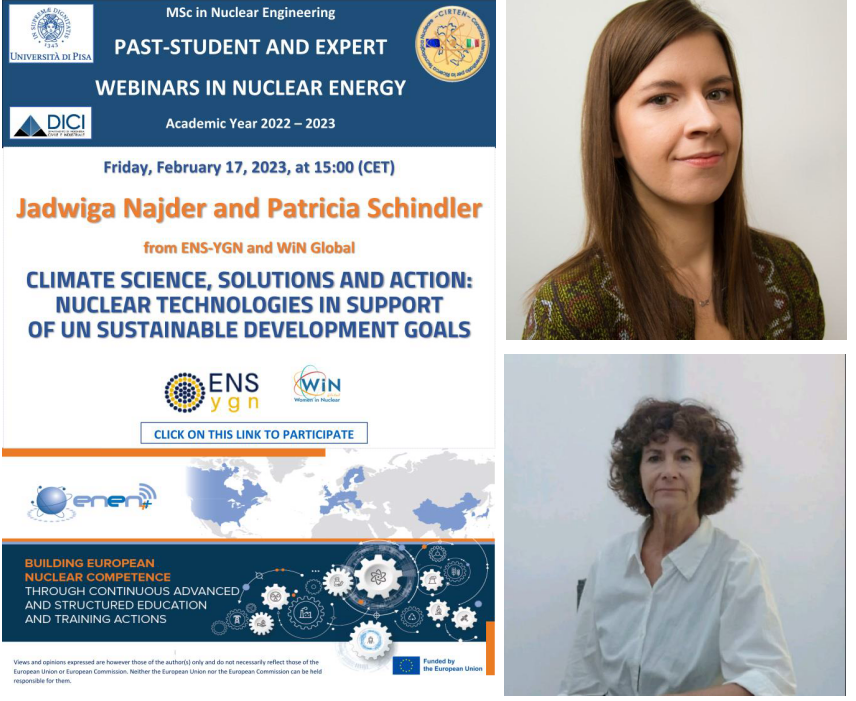
Jadwiga Najder is a nuclear engineer supporting a design of a NPP. As a Youth Community leader, I am also working to boost the participation of young people in the nuclear space. Passionately educating about solutions to climate change, for several years, I prepare youth and NGOs' representatives to represent nuclear at UNFCCC COP conferences. She worked as Nuclear Engineer at Oakridge SAS, France and has been Intern Engineer at CEA, Service d'étude des réacteurs et de mathématiques appliquées, Saclay, France.
Patricia Schindler worked for 35 years at the Alternative Energies and Atomic Energy Commission (CEA). Graduated with a master's degree in engineering (1985), specializing in metallurgy, she spent 5 years in a laboratory of metallurgical expertise, then turned to project management in the nuclear field. She has thus worked with multidisciplinary teams at the national and international level. She began her career in the field of sodium chemistry within FBR (Fast Breeder Reactors), before moving on to study projects concerning the PWR (Pressure Water Reactor) sector. As R&D project manager, she successively led various projects concerning the evolution of chemistry on the primary or secondary side of PWRs. These projects have led her to study, design and monitor the implementation of test facilities, combining the technique of nuclear measurements. These fields involving high temperatures and high pressures, she thus obtained in 2007 the title of expert in ThermoHydraulics in a chemical environment.
She has been actively involved since 2012 in the network “Women in Nuclear (WiN)”, as well as in various regional initiatives to promote gender equality in science and technology in order to also increase the participation of women in the nuclear sector. She joined the WiN Global Steering Committee in 2020 when she became secretary. She currently also acts as vice-president of WiN France, and leader of WiN Europe.
Webinar by Alessandro Petruzzi on Friday February 24, 2023 at 15:00
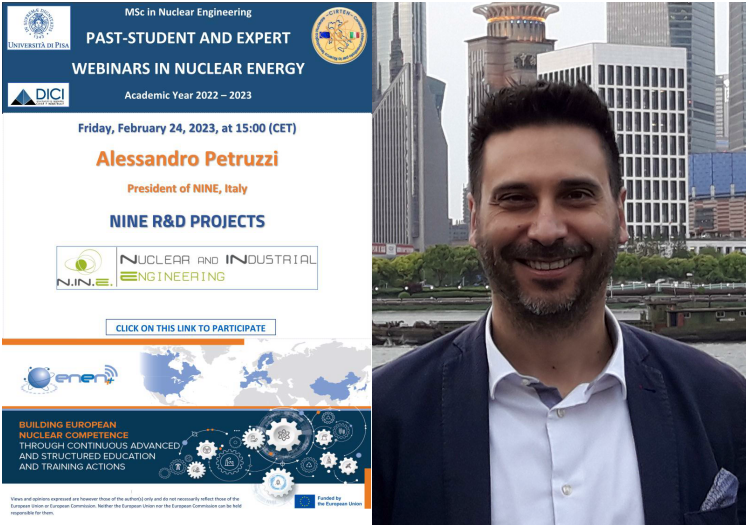
Alessandro Petruzzi is the President of NINE and current Head of the Plant Thermal-Hydraulics Area devoted to safety analysis and licensing of NPP.
Prior to join NINE, he worked over 9 years in the Nuclear Research Group of San Piero a Grado (GRNSPG) and he spent the year 2004 working as an intern-assistant in the Pennsylvania State University (USA).
He got his PhD Degree in “Nuclear and Industrial Safety” Course of the “Leonardo da Vinci” Doctoral Engineering School in 2008, discussing the thesis titled “Development and Application of Methodologies for Sensitivity Analysis and Uncertainty Evaluation of the Results of the Best Estimate System Codes applied in Nuclear Technology”.
The methods for uncertainty and sensitivity analysis applied to thermal-hydraulics system codes constitute his main interest as well as the assessment of computer codes and the development of sensitivity and uncertainty methods.
He was involved in several activities connected with safety and licensing process, including the preparation of Chapter 15 of Final Safety Analysis Report (FSAR) of Atucha-2 NPP (Argentina), Hanhikivi-1 NPP (Finland) , the support to the Generic Design Assessment (GDA) Step-3 and 4 for the HPR-1000; the participation as expert to the Generic Reactor Safety Review (GRSR) service organized by IAEA for several NPP design (more than 10 different NPP).
He is the founder and director of the NINE Multi-Level Training Program which includes several courses organized each year and devoted to Scaling, Uncertainty and 3D COuPled Code Calculation, Models and Methods for Advanced Reactor Safety Analysis, Nuclear Reactor Safety Hand-On Training. He was involved also as expert in the Safety Assessment Education and Training (SAET) Programme of IAEA which has been designed to support IAEA Member States with development of required safety assessment capacity and competency.
Webinar by David Novog on Friday March 10, 2023 at 15:00
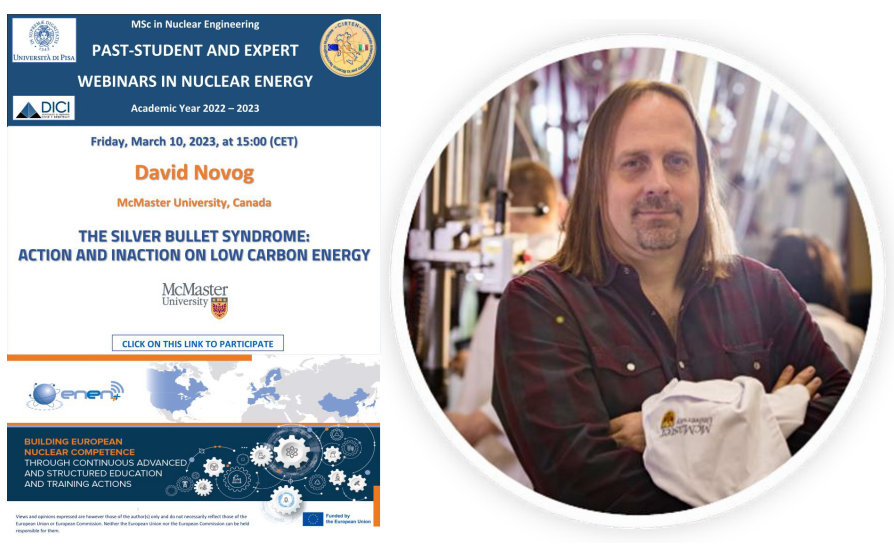
Dr. David Novog is an expert in safety analysis methods and uncertainty quantification. He holds an Industrial Research Chair in Nuclear Safety and has been a professor at McMaster since 2006.
From 1998-2005 he worked at Ontario Hydro, OPG, Nuclear Safety Solutions and AMEC in the areas of reactor physics, thermal hydraulics and reactor trip assessment. Prior to these positions he was a visiting researcher at Mitsubishi Heavy Industries in Japan on their APWR project.
His current research is focused on experimental and analytic issues related to fuel integrity, severe accident modelling, and emergency planning. He has large projects underway on improved maintenance instrumentation and applied radiation imaging.
Webinar by Daniel Freis on Friday March 17, 2023 at 15:00
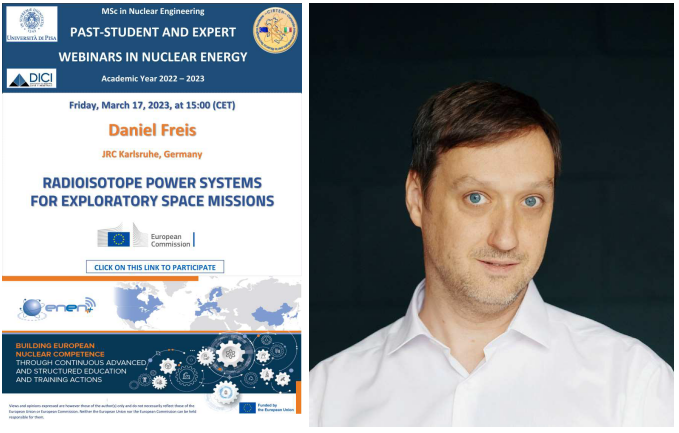
Daniel Freis is a Nuclear Engineer and works since 2013 as a Scientiffic Officer at the European Commission’s Joint Research Centre (JRC) in Karlsruhe, where he coordinates the group for Synthesis and Characterisations within the Nuclear Materials Research unit.
Before joining JRC Karlsruhe, Daniel was working at Westinghouse Electric Germany GmbH on safety assessment of nuclear power plants and severe accident mitigation systems. He obtained his PhD degree in Nuclear Engineering from RWTH Aachen University in collaboration with JRC on severe accident behaviour of high-temperature reactor fuel.
Daniel’s research is mainly focussed on safety assessment and safety testing of nuclear fuels, with an emphasis on Generation IV metal cooled and high temperature reactors, and he is responsible for JRC’s activities on Radioisotope Power Systems for space applications based on Am-241 and Pu-238.
Webinar by Juha Poikola on Friday March 24, 2023 at 14:30
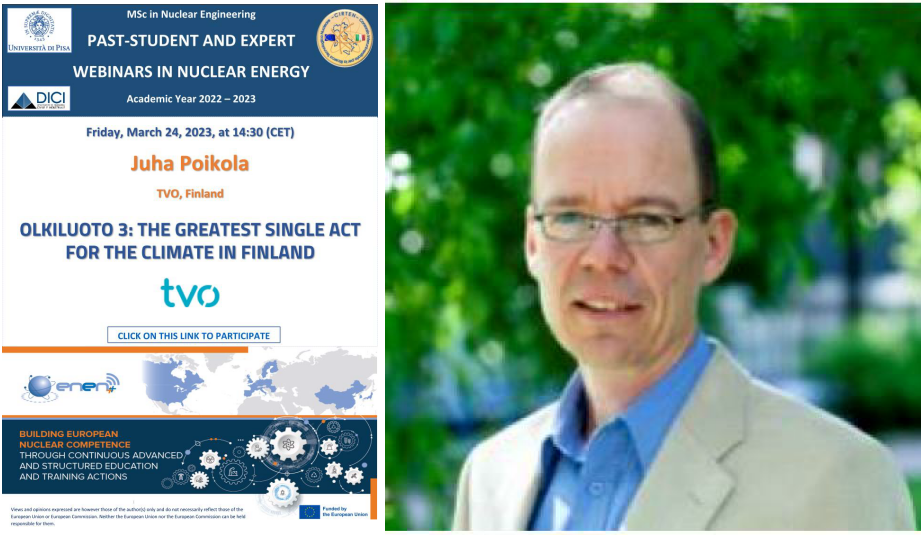
Mr Juha Poikola title is Manager, Public Relations. He also works as an TVO's expert in energy and climate policy. Currently Juha is also responsible for Olkiluoto 3 communication. Mr Poikola has actively participated into lobbying for positive political decisions for Olkiluoto 3 and Olkiluoto 4. Finnish parliament made these decisions in years 2002 and 2010. Mr Poikola has worked at energy sector for 21 years. Before that he worked for forest industry.
Webinar by Bogdan Buhai on Friday March 24, 2023 at 16:00
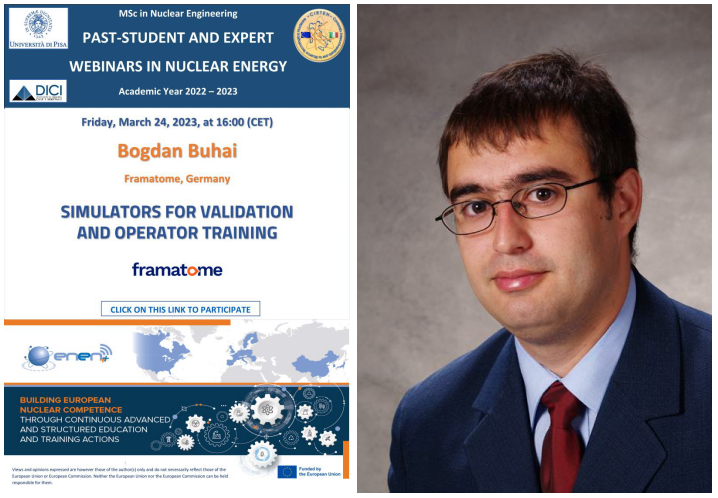

Webinar by Mark Anderson on Friday March 31, 2023 at 15:00
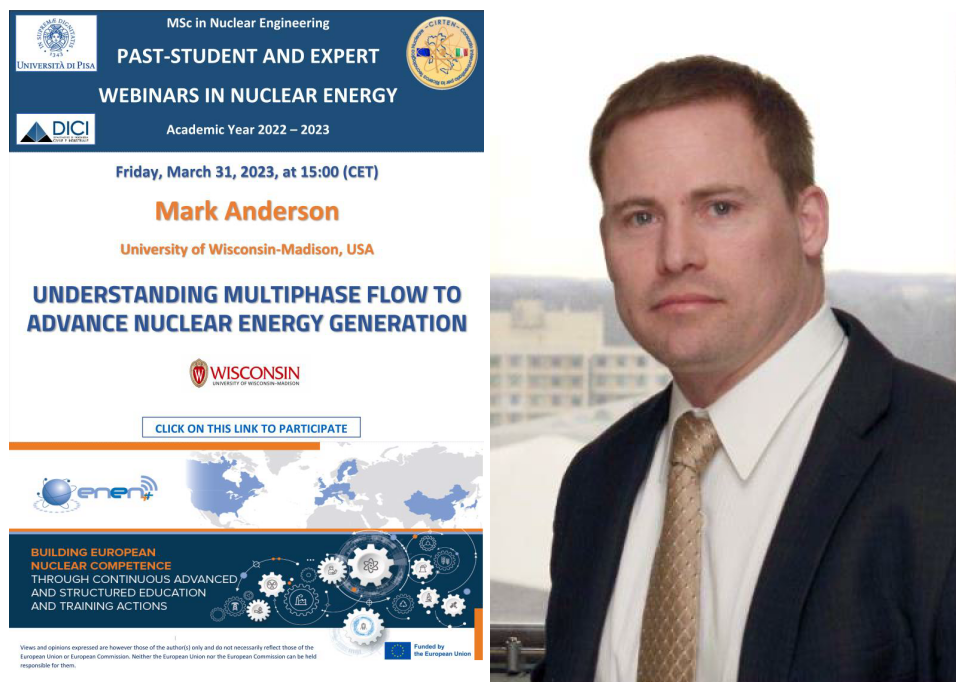
Mark Anderson is the Consolidated Paper Associate Professor in the Department of Mechanical Engineering at the University of Wisconsin – Madison and Director of the University of Wisconsin's Thermal Hydraulic Laboratory. Dr. Anderson studies physics, thermal-hydraulics, and, material corrosion issues related to several different fluids (salts, liquid metals, SCW, sCO2) related to energy production and storage. He is currently the U.S. representative to the International Atomic Energy Agency (IAEA) for the coordinated research project on supercritical fluids and has active research on sCO2 Brayton cycle for nuclear, solar, and fossil advanced power generation. He has been awarded five patents and has published over 150 journal papers in various areas related to energy production and utilization, fundamental physics, and materials.
Webinar by Donato Lioce on Friday April 14, 2023 at 15:00
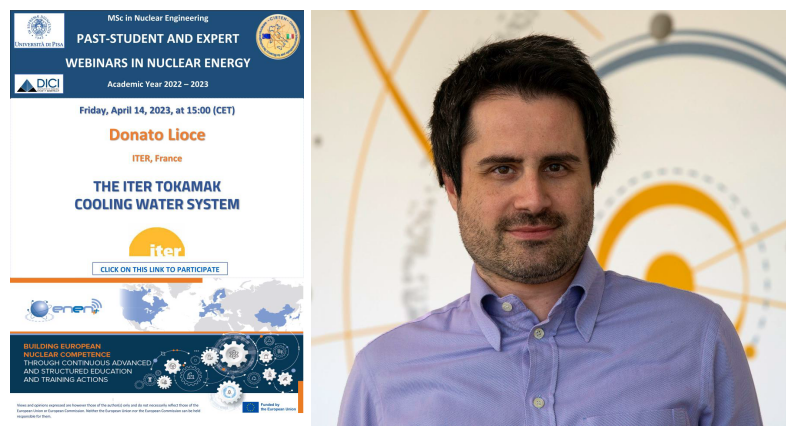
Donato Lioce has a PhD in Nuclear Engineering with a thesis on ‘Pre-operational Tests and Design Basis Accidents Simulations for a Generation III+ Nuclear Power Plant’. He leads the Tokamak Cooling Water System Section at ITER (ww.iter.org), having the responsibility to design and manufacture the primary cooling system of the ITER fusion reactor. Before joining the ITER organization, he worked in Ansaldo Nucleare S.p.A. on many projects spanning from service to operating nuclear stations to design of gen. IV reactors, and, before that, he worked for Westinghouse Electric Company on generation III+ reactors.
Webinar by Sergio Ciattaglia on Friday April 21, 2023 at 15:00
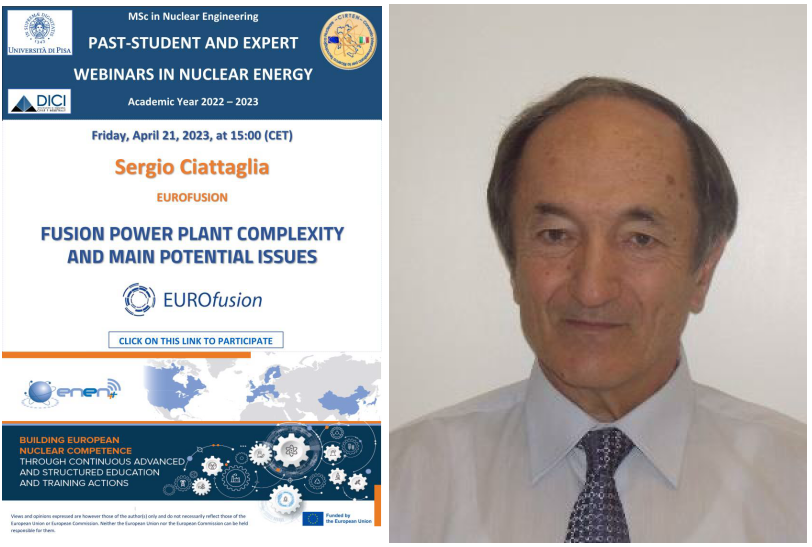
Sergio Ciattaglia is an Electrical Engineer, graduated in 1973. After 3 years in the railway company (operation and maintenance of electrical and safety systems) and a year (1977) at Pisa University for a course on Nuclear Safety and Radioprotection, he worked for 12 years on the licensing of Italian NPPs. Since 1990 he is working in nuclear fusion field: safety analysis of NET, Director of Frascati Tokamak Upgrade (94-98) and manager of ENEA R&D activities. Since 2000 he moved abroad, first at JET, on operation and maintence, than on ITER licensing (7 years at Cadarache) and from 2014 on EU-DEMO safety analysis, plant electrical system and integration, in the design central team of EURO-fusion in Garching.
Webinar by Johanna Hansen on Friday April 21, 2023 at 16:30
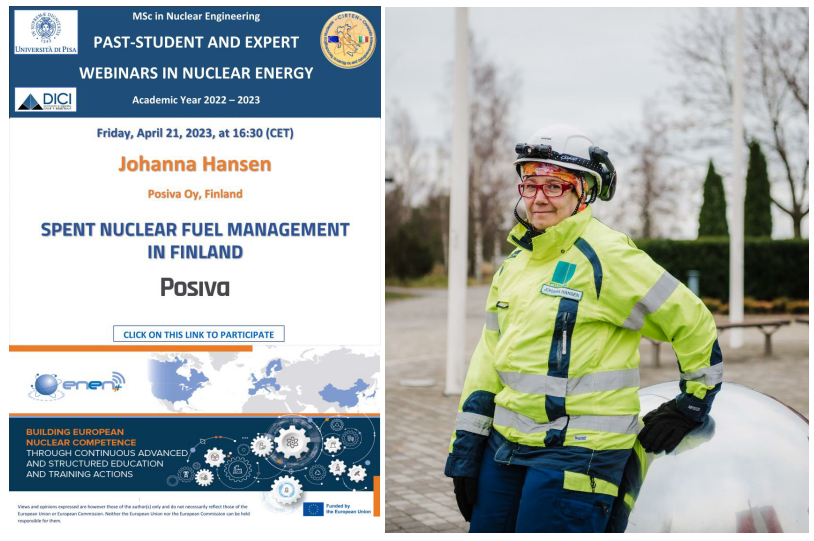
Johanna Hansen
Olkiluoto, 27160 Eurajoki, Finland
Posiva Oy – Eurajoki, Finland, R&D Coordinator, 2002 to Present
Posiva Oy, - Loviisa, Finland, Site Field Manager/Geo Research Assistant, 10/1997 to 2/2002
- Dedicated and highly motivated nuclear waste management professional with career-long history driving planning and execution of complex projects focused on cutting-edge research and development for safe nuclear fuel disposal. Lead and mentor teams in producing exceptional results under tight deadlines and in conformance with stringent engineering requirements.
- Currently Secretary General for IGD-TP (Implementing Geological Disposal – Technology Platform) 2022-2023
- Co-ordinated Euratom’s FP7 DOPAS project from 2012 to 2016 (budget up to 16 M€).
- Subproject manager for the disposal system demonstration with prototype machinery in real conditions Full Scale In-Situ System Test (FISST) and Project manager for EBBO (Engineered Barrier Behaviour in ONKALO)
- Project manager for Disposal Facility Closure project Oversee project planning, schedule development, milestones, deliverables and budgets. Manage performance of teams, ensuring consistent alignment with requirements to achieve goals and deliver high-quality results..
- Developed low pH cementitious materials and backfill and closure subsystem for KBS-3 concept at Olkiluoto, including field supervision of underground installation.
- Selected as task force leader for WP4 Task 4.1 as part of Horizon 2020 project, Modern 2020.
- Supervised site characterisation investigations like core drilling, groundwater measurements, sampling and workflow for site investigations at Hästholmen. Contributed to EIA process and communicated with stakeholders at the municipality level.
Webinar by Mariano Tarantino on Friday April 28, 2023 at 15:00
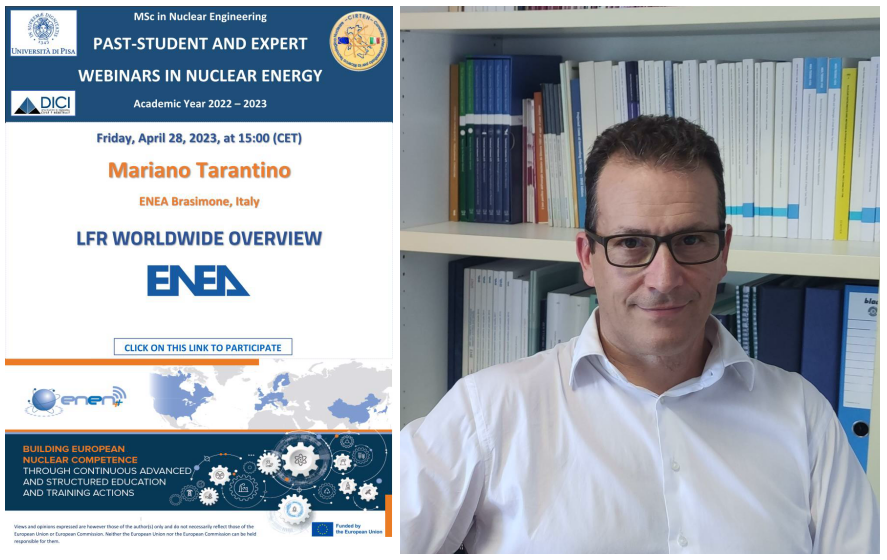
Dr. Mariano Tarantino, ENEA. Mariano Tarantino got is PhD degree in “Industrial and Nuclear Safety Course” of the “Leonardo da Vinci” Doctoral Engineering School in 2008, discussing a thesis work on “Experimental Investigation of the Thermal Hydraulic Behaviour of Heavy Liquid Metal Cooled Reactors”.
From November 2010 to December 2018 he acted as Scientific Advisor of Gen. IV R&D domain in the frame of the Research Program Agreement (ADP) between ENEA and Italian Minister for the Economic Development (MiSE).
Mariano Tarantino has been involved in heavy liquid metal technology development since 2003, leading numerous programs at national and international level. In this frame, he worked on heavy liquid metal heat transfer, prototypical components design, operation and experimental characterization of innovative solutions for LFRs, experimental infrastructures implementation, coolant chemistry assessment and material development and qualification.
Mariano Tarantino is also a member of the FALCON Consortium for the ALFRED (DEMO LFR) promotion, design, construction and operation in Romania. Specifically, he is responsible of the RD& Qualification Task Force in FALCON.
He is author of more than 50 papers in international journals and more than 80 papers in peer-reviewed international conferences.
Presently he is the Head of Nuclear Safety, Sustainability and Security Division in the Department of Fusion and Technologies for Nuclear Safety and Security, ENEA.
Webinar by Alice D'Onofrio on Friday May 5, 2023 at 16:00
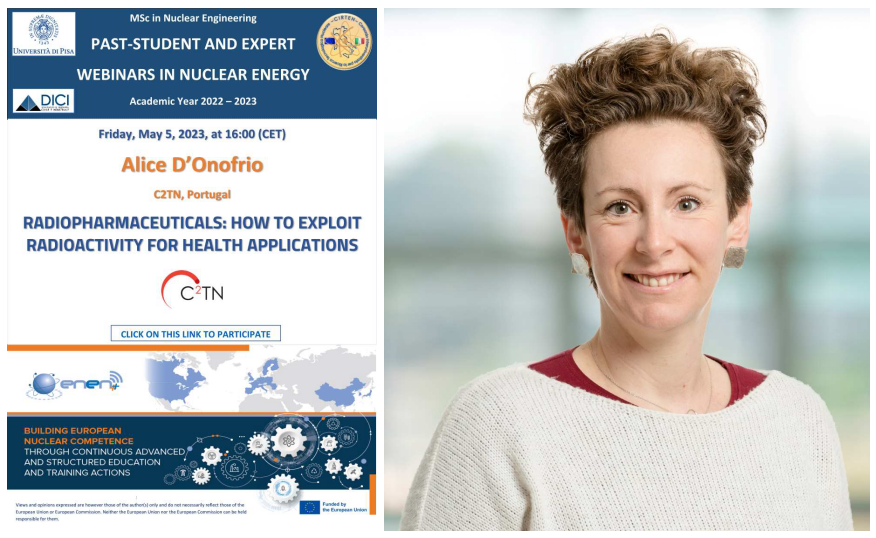
Alice D’Onofrio worked in several Medicinal Chemistry and in Organic Synthesis projects in different European research groups before starting a PhD in Radiochemistry at the Center for Nuclear Sciences and Technologies (C2TN/IST) of the Instituto Superior Técnico of Lisbon. Her PhD research, carried out within the Marie Curie Innovative Training Network MEDICIS-Promed, focused on the development of clickable radiocomplexes for cancer theranostics. She has been involved in the development and pre-clinical evaluation of several radiolabeled compounds (antibodies, peptides, nanoparticles) directed at biological targets relevant for oncological applications (GRPr, TEM1, NKR1). Currently she is working as a post-doctoral researcher in the Radiopharmacy Lab of the Inselspital at the University of Bern.
Webinar by Armando Nava on Friday May 12, 2023 at 15:00
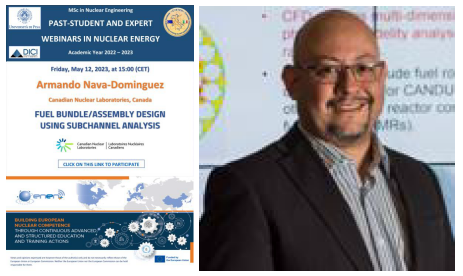
Armando Nava Dominguez has a Bachelor’s degree in Energy Engineering, specialized in Nuclear Thermalhydraulics and a Master’s degree in Nuclear Thermalhydraulics. He joined CNL in 2005 as a Thermalhydraulics Analyst, specializing in code development and validation of the subchannel code ASSERT-PV. He joined the Canadian Super Critical Water Reactor (SCWR) team in 2011 as part of the Generation-IV International Forum (GIF) program. He is the Canadian member and co-chair of the SCWR Thermalhydraulics and Safety under GIF. At CNL, he is the Technical Lead of the SCWR Gen IV project, and Head of the Advanced Reactor Technologies section. In addition, he has five years of experience in the private sector conducting deterministic and probabilistic safety analyses of nuclear power plants.
Webinar by Carlo Parisi on Friday May 19, 2023 at 15:00
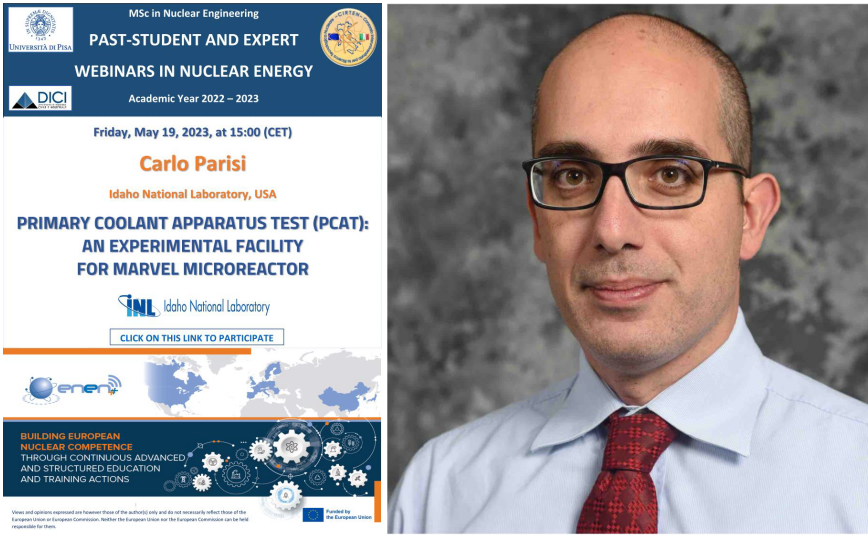
Carlo Parisi is a scientist with over 19 years of experience in academics and government laboratories. In 2004 he got a M.Sc. and in 2008 a Ph.D. in Nuclear Engineering at University of Pisa, Italy. His area of expertise includes thermal hydraulics, neutronics and uncertainty quantification. Since October 2015 he is a scientist at the Idaho National Laboratory, USA. His current activities include thermal hydraulic design/analysis and uncertainty quantification for several projects: MARVEL Microreactor, Thermal Test Reactor Capabilities, TREAT Sodium Loop Experiment, Light Water Reactors Sustainability. He is member of the INL RELAP5-3D code development team. He is member of the American Nuclear Society since 2004.
Webinar by Ronald Schram on Friday May 26, 2023 at 15:30
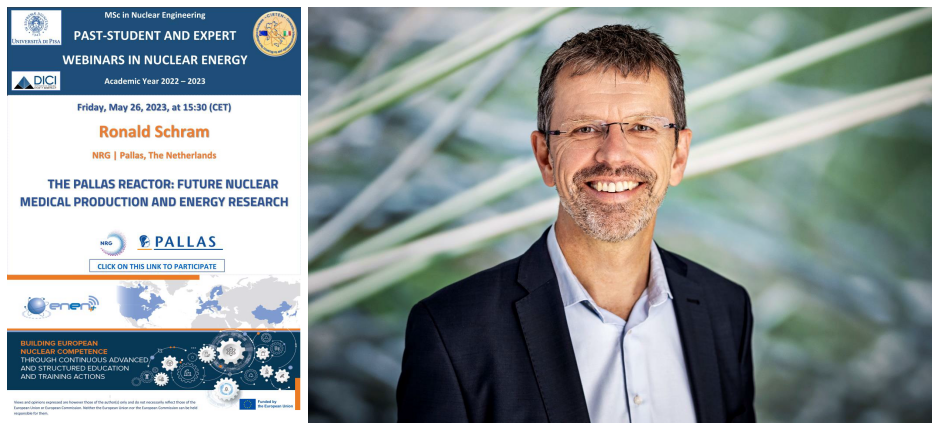
Ronald Schram has studied physical chemistry at the University of Amsterdam. In 1994 he acquired his Ph.D. on statistical mechanics and fluctuation theory, applied to fast and slow sound phenomena in binary gas mixtures. In that same year he started to work in Petten, studying thermochemical properties of nuclear materials. He spent almost 30 year of his career in various positions in research, operation, and management, both in the nuclear energy and nuclear medical domain. He is closely involved in the PALLAS reactor project, from the first initiative in 2003, until now. In his current role as Director Strategic Alliances of NRG|PALLAS, Ronald is involved in the international and national networks on nuclear knowledge infrastructure, both for energy and health. He has a strong interest in practical applications and the positive societal impact of nuclear, recognizing the importance of nuclear knowledge and training. The presentation will outline the role of research reactors in nuclear medical production and R&D for energy and health, and the underlying principles of irradiation technology. The deployment of the PALLAS reactor for future nuclear medical production and energy research will be highlighted in the webinar.
Webinar by Shuisheng He on Friday June 9, 2023 at 15:00
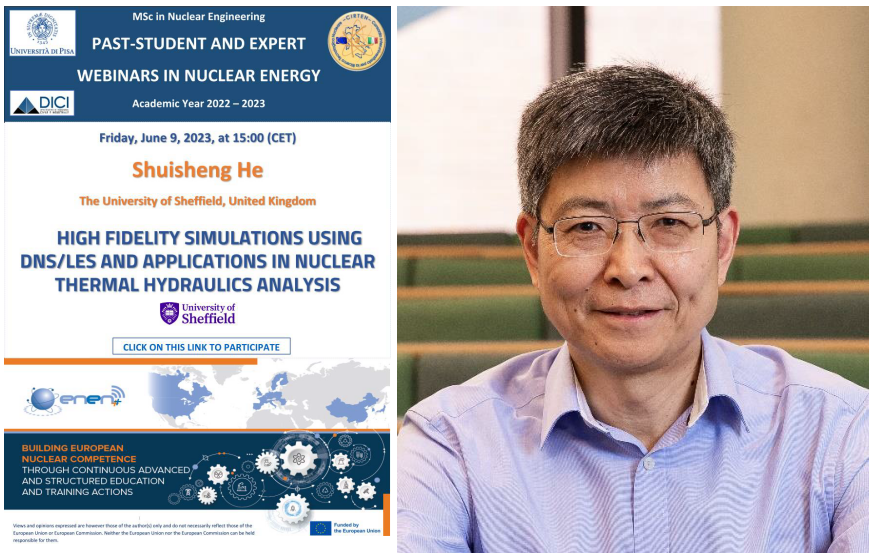
Shuisheng He is Chair in Thermofluids in the Department of Mechanical Engineering at University of Sheffield, UK, and a chartered engineer (CEng) and Fellow of the Institution of Mechanical Engineers (FIMechE). After completing his PhD in the Nuclear Research Group at University of Manchester, he spent over three years at British Energy (now EDF Energy) as Core Heat Transfer Analyst, before starting his academic career in 2002. Shuisheng’s research focuses on turbulence and nuclear thermal hydraulics. The latter includes modelling for liquid-metal, supercritical-water and gas-cooled reactors using high fidelity DNS and LES as well as conventional RANS CFD. His group has developed several in-house CFD codes including a DNS/LES package CHAPSim. They have also developed a new concept coarse-grid CFD referred to as Sub-channel CFD. Their research interest has recently extended to fusion thermal hydraulics. He is Leader of UK Fluids Network Special Interest Group (SIG) in Nuclear Thermal Hydraulics (https://fluids.ac.uk/sig/Nuclear), and Chair of the Collaborative Computational Project in Nuclear Thermal Hydraulics (https://ccpnth.ac.uk/), and routinely provides expert review and consultancy for EDF Energy.
Webinar by Mariano Tarantino on Friday June 16, 2023 at 15:00
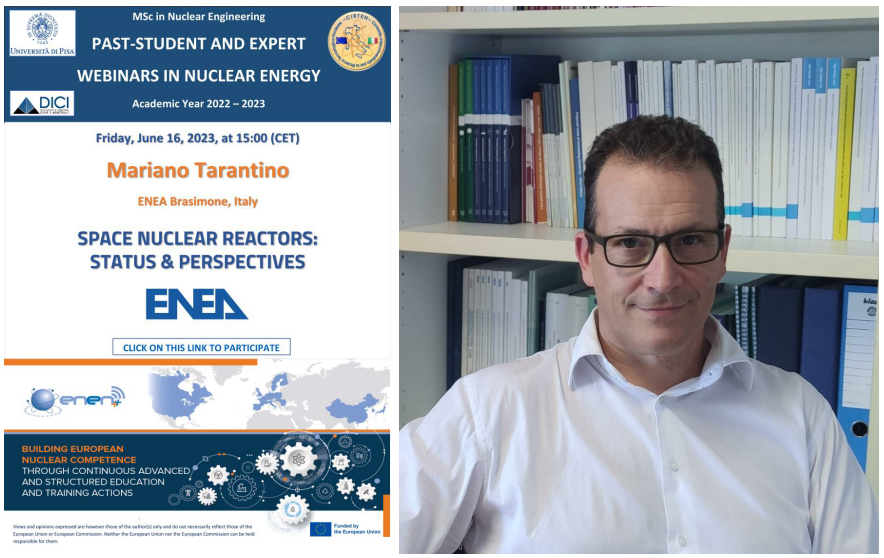
Dr. Mariano Tarantino, ENEA. Mariano Tarantino got is PhD degree in “Industrial and Nuclear Safety Course” of the “Leonardo da Vinci” Doctoral Engineering School in 2008, discussing a thesis work on “Experimental Investigation of the Thermal Hydraulic Behaviour of Heavy Liquid Metal Cooled Reactors”.
From November 2010 to December 2018 he acted as Scientific Advisor of Gen. IV R&D domain in the frame of the Research Program Agreement (ADP) between ENEA and Italian Minister for the Economic Development (MiSE).
Mariano Tarantino has been involved in heavy liquid metal technology development since 2003, leading numerous programs at national and international level. In this frame, he worked on heavy liquid metal heat transfer, prototypical components design, operation and experimental characterization of innovative solutions for LFRs, experimental infrastructures implementation, coolant chemistry assessment and material development and qualification.
Mariano Tarantino is also a member of the FALCON Consortium for the ALFRED (DEMO LFR) promotion, design, construction and operation in Romania. Specifically, he is responsible of the RD& Qualification Task Force in FALCON.
He is author of more than 50 papers in international journals and more than 80 papers in peer-reviewed international conferences.
Presently he is the Head of Nuclear Safety, Sustainability and Security Division in the Department of Fusion and Technologies for Nuclear Safety and Security, ENEA.
Webinar by Govert de With on Friday June 23, 2023 at 15:00
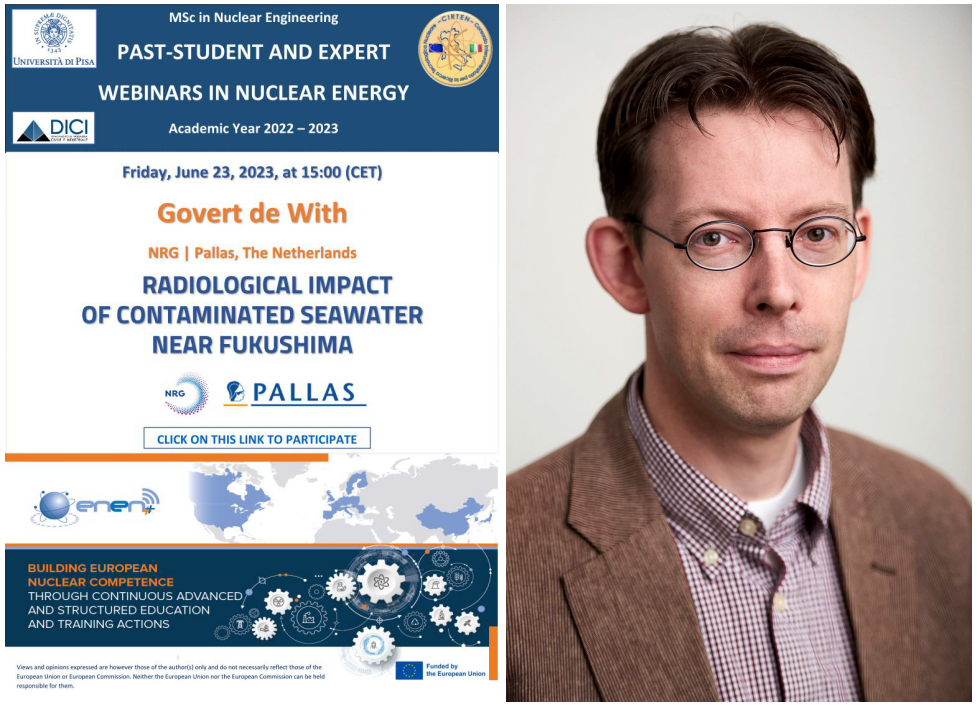
Govert de With has a PhD in computational fluid dynamics from the University of Hertfordshire (UK). Govert has more than 15 years’ experience in the field of radiation protection and is at present responsible for the radiation protection research in NRG, which includes research in the field of radioecology. He is a member of various professional bodies and committees, which includes a.o. membership of the UNSCEAR Expert Group on occupational exposure, and various ISO and CEN on radiation measurement. Following the accident at the Fukushima Daiichi Nuclear Power, Govert (co)authored multiple papers on the impact of the accident to the aquatic wild-life and recently assessed the consequences from Japan’s proposal to release contaminated water to the Pacific Ocean.
Webinar by Sergio Orlandi on Friday June 30, 2023 at 15:00
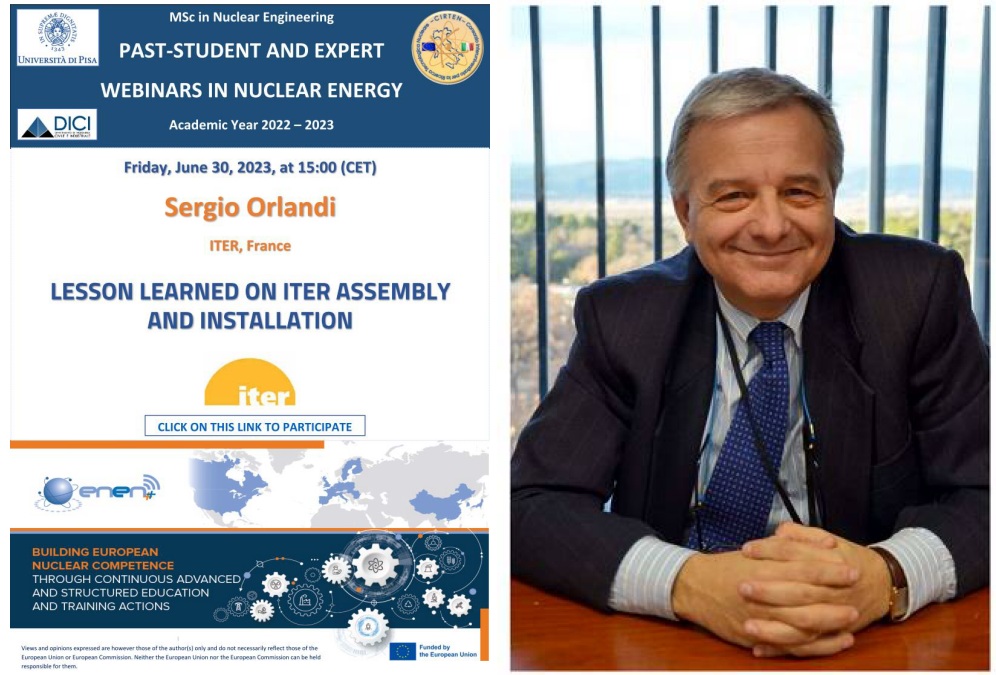
Sergio Orlandi graduated in Nuclear Engineering from the University of Pisa and is fluent in three languages. After a long experience in the Ansaldo Group, he was also general manager of Ansaldo Nucleare. Since 2013 he is the Head of the " Plant and Machine Engineering and Assembly" Department of the ITER project for the completion of the Fusion Nuclear Plant in Saint Paul Lez Durance, France. He is Member of the European Academy in Science and Arts and Dean of the Commission VI on Sustainable Energy.

